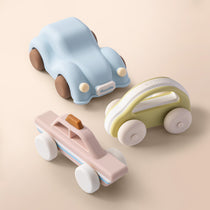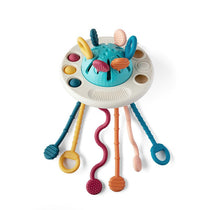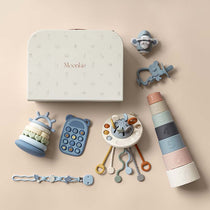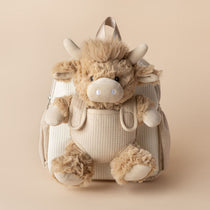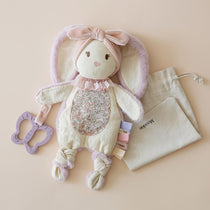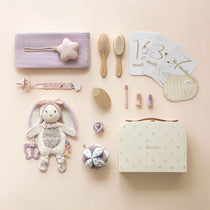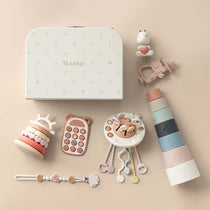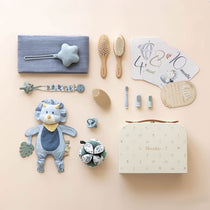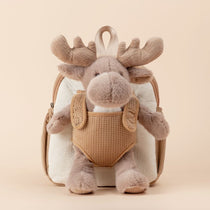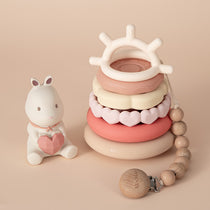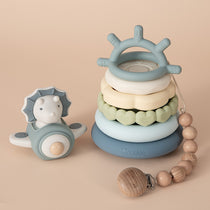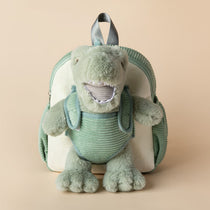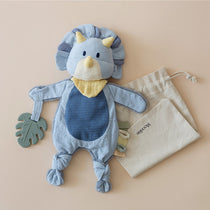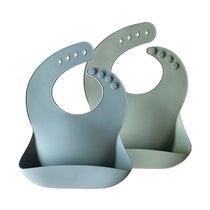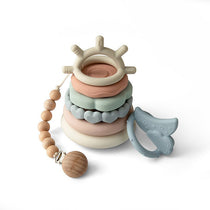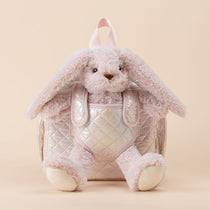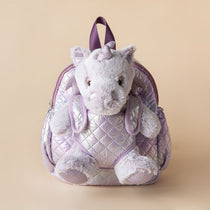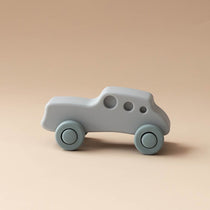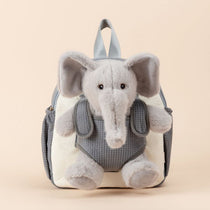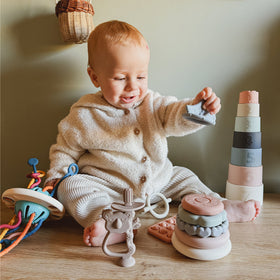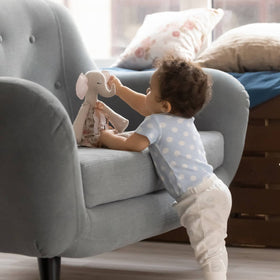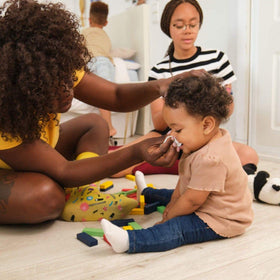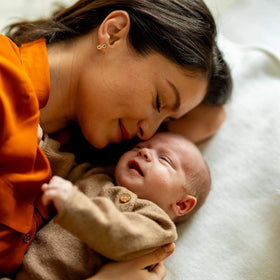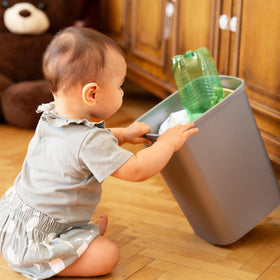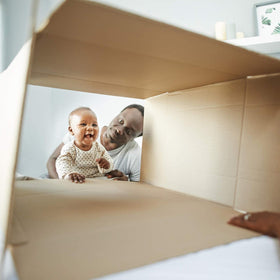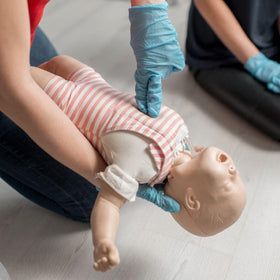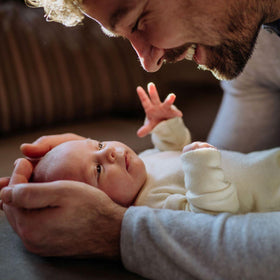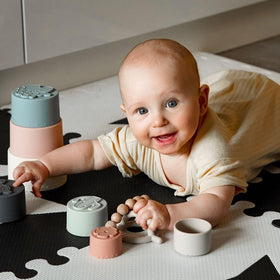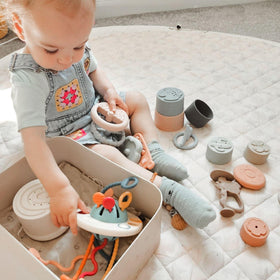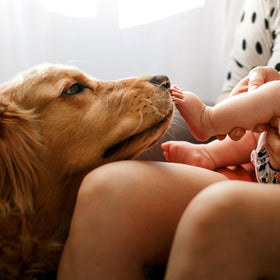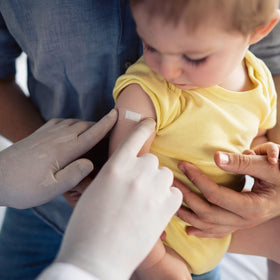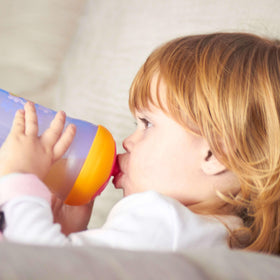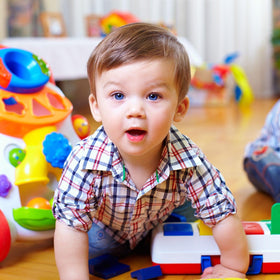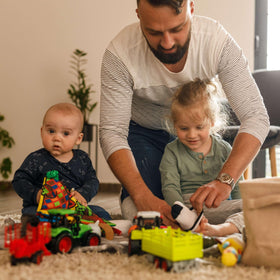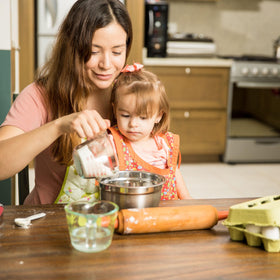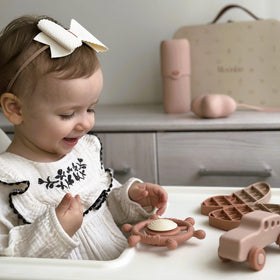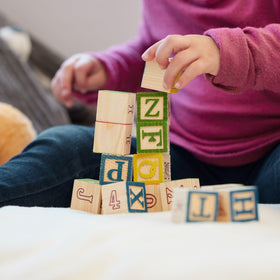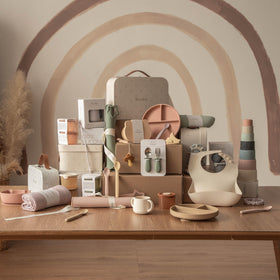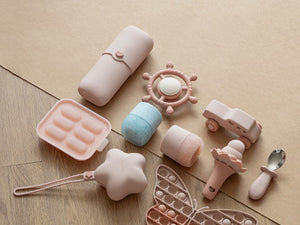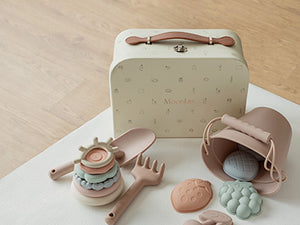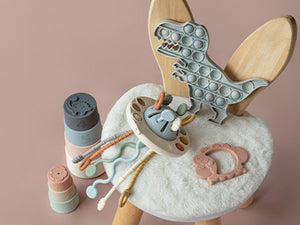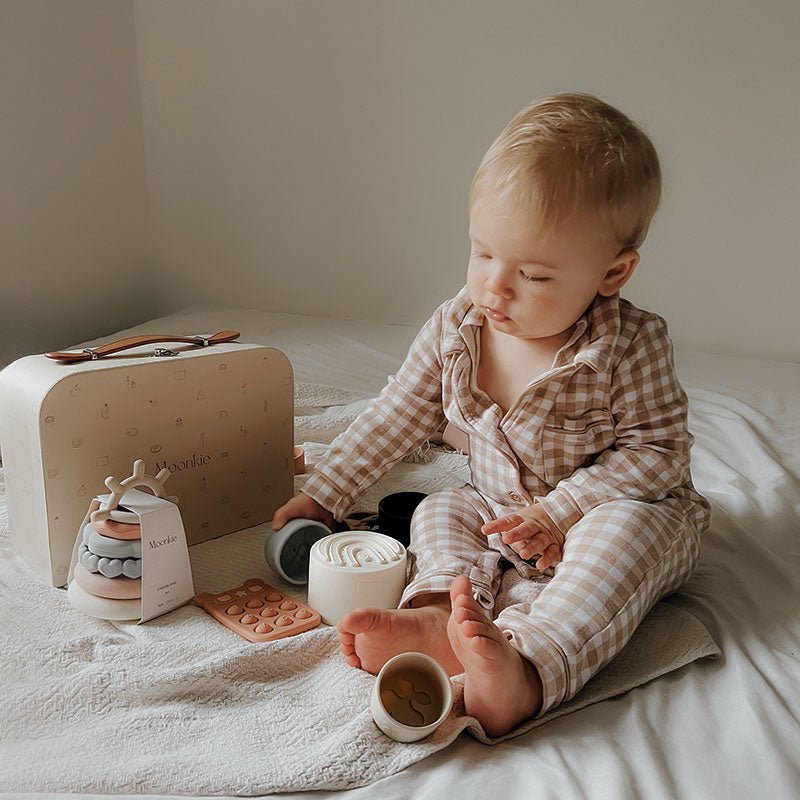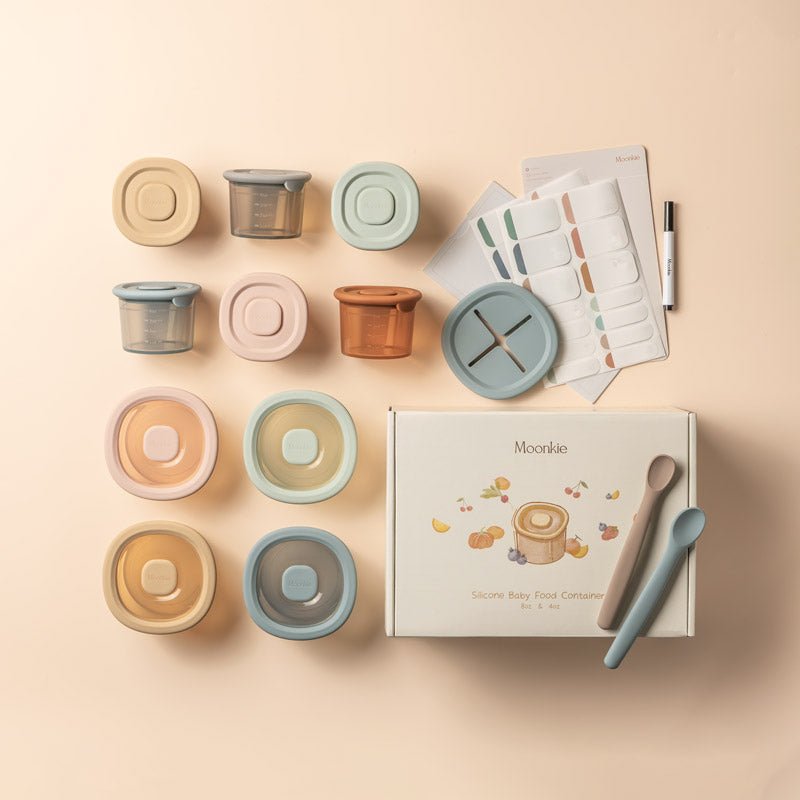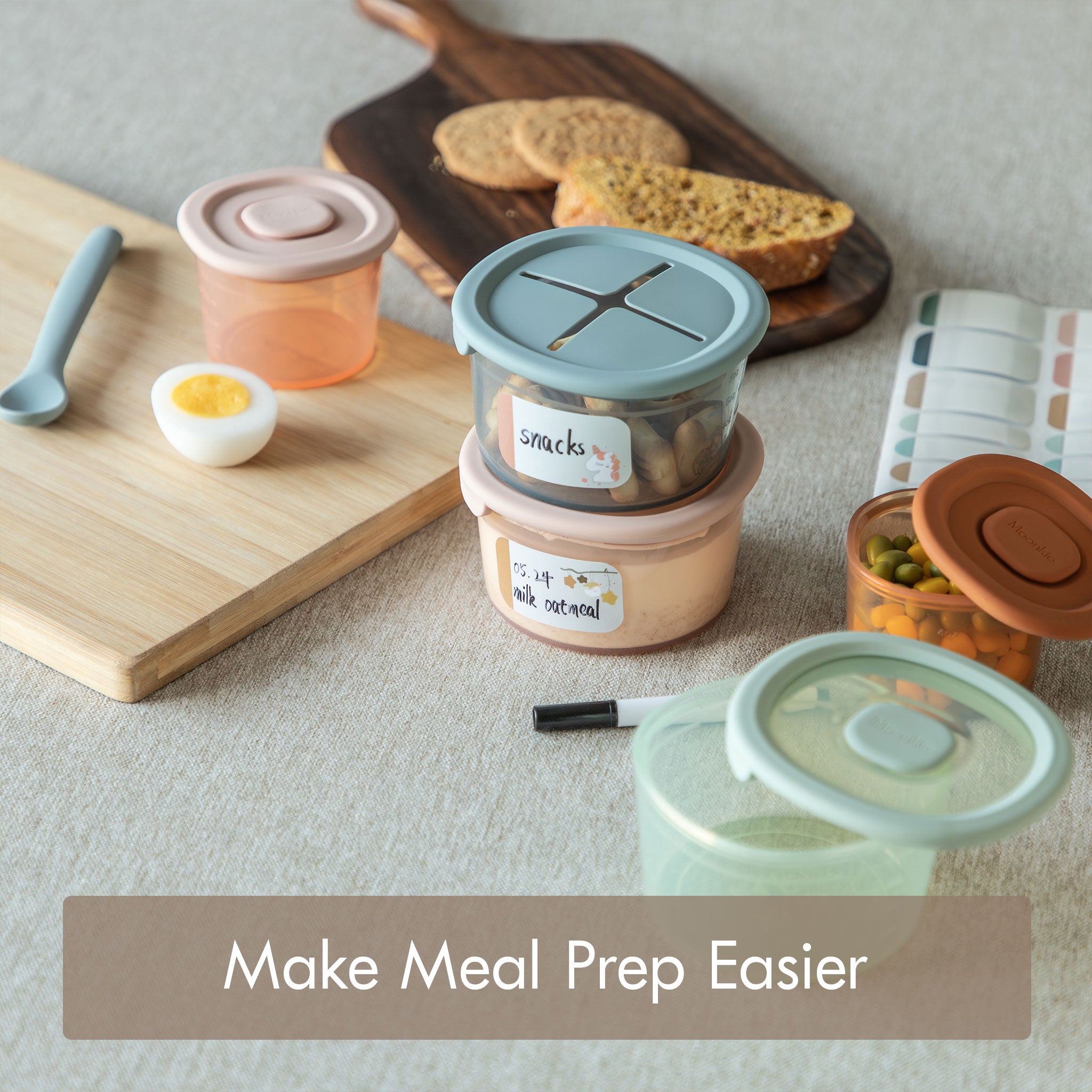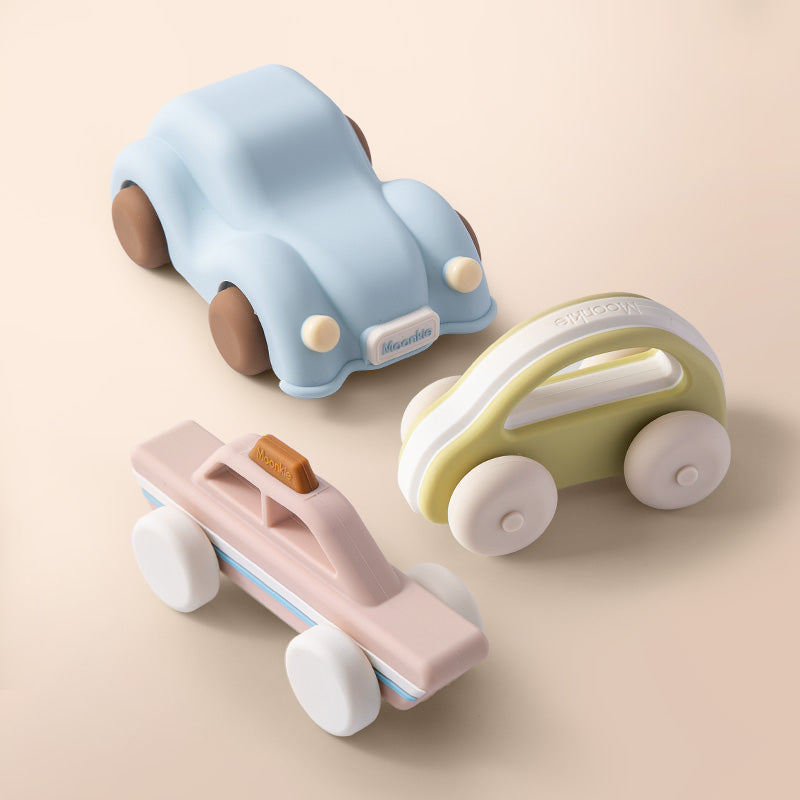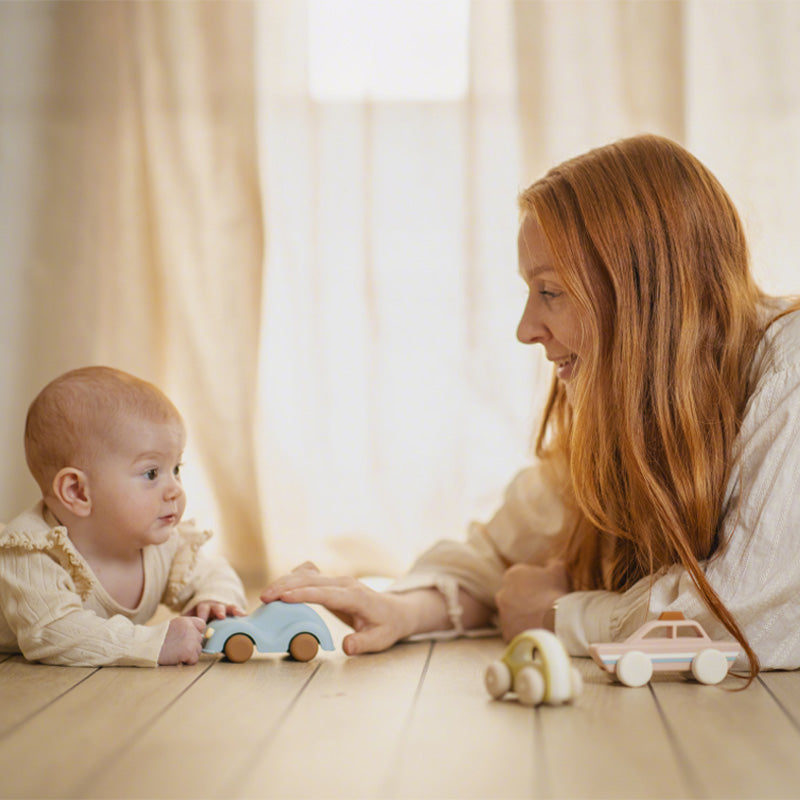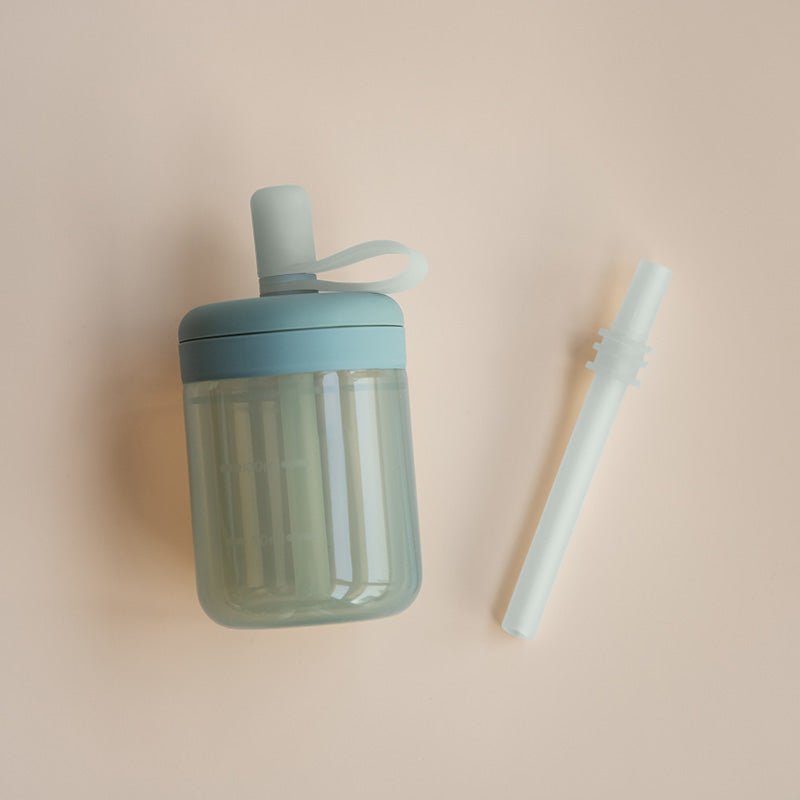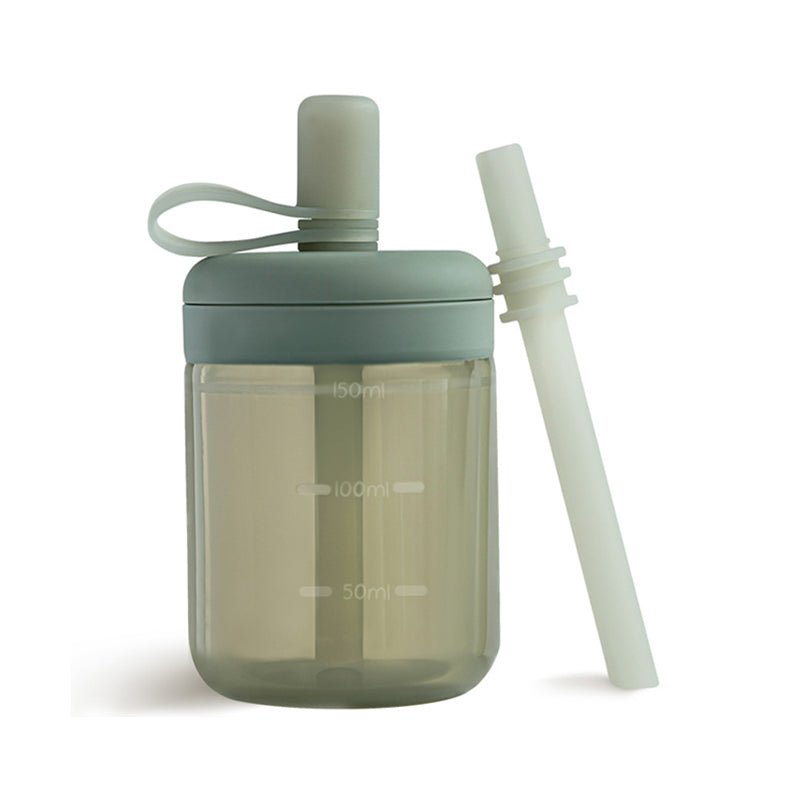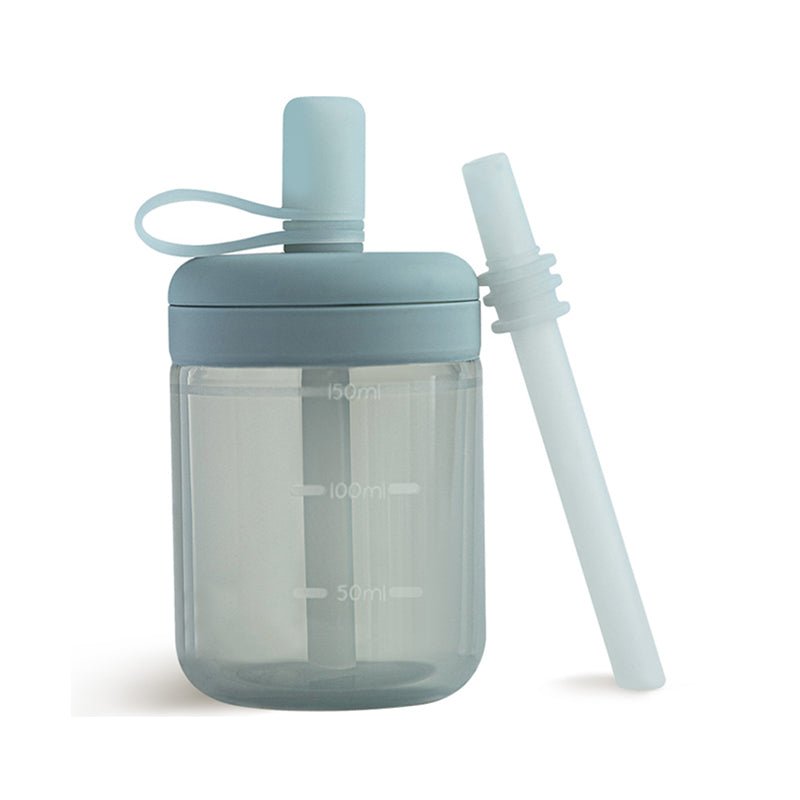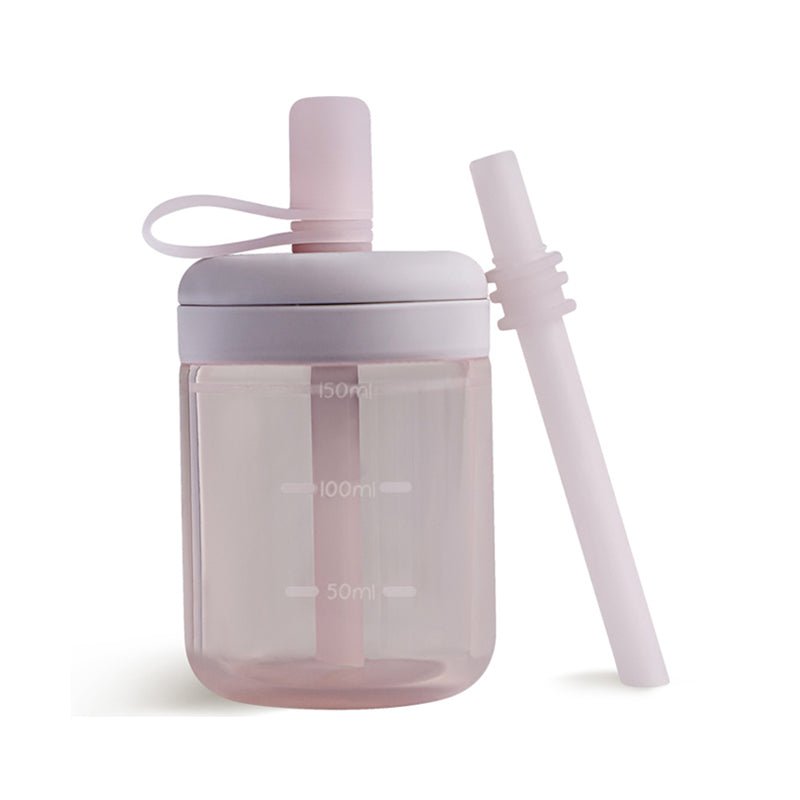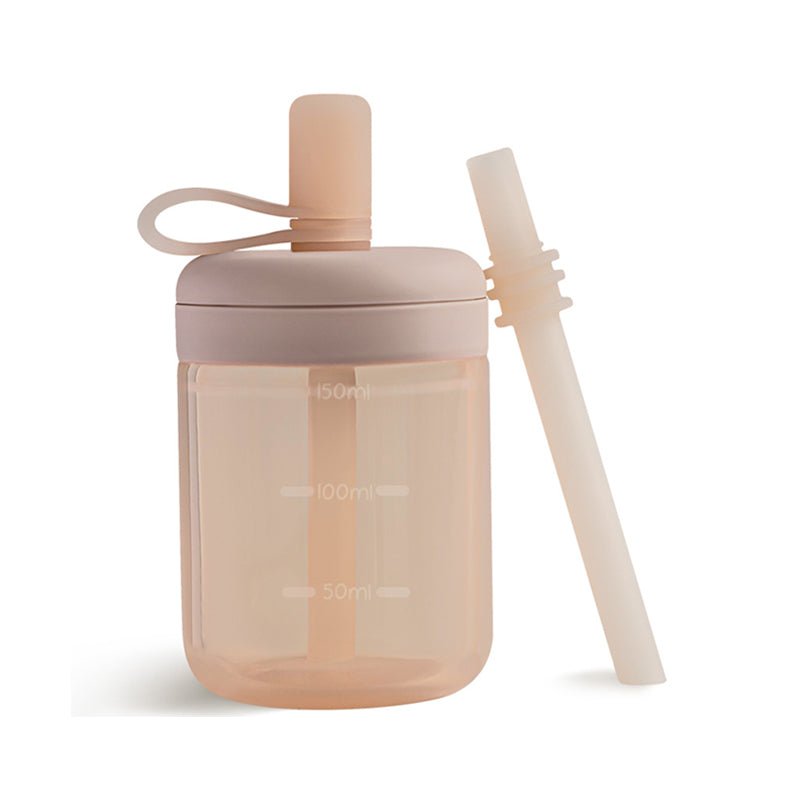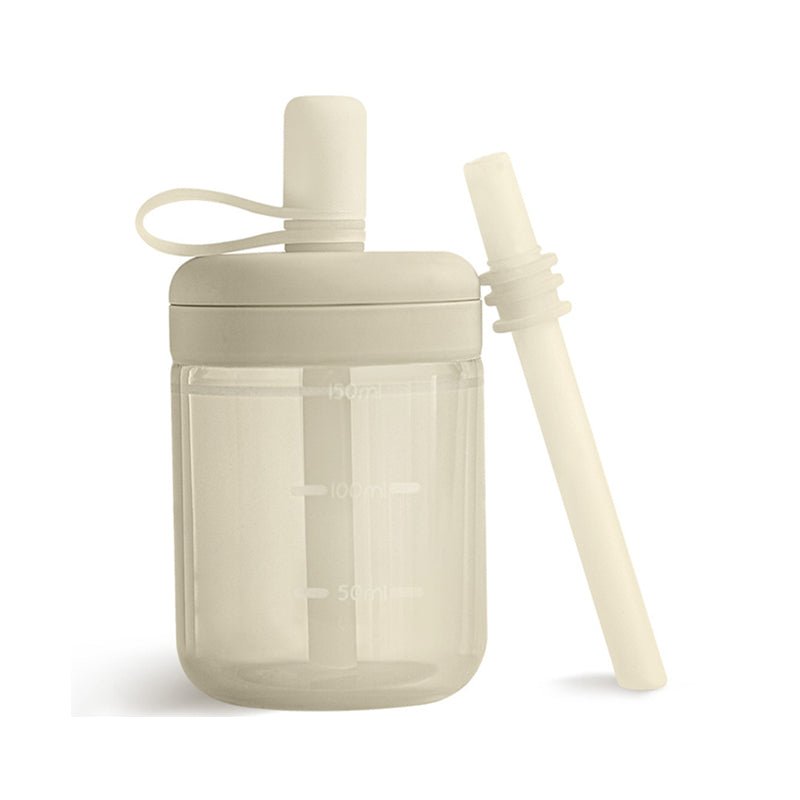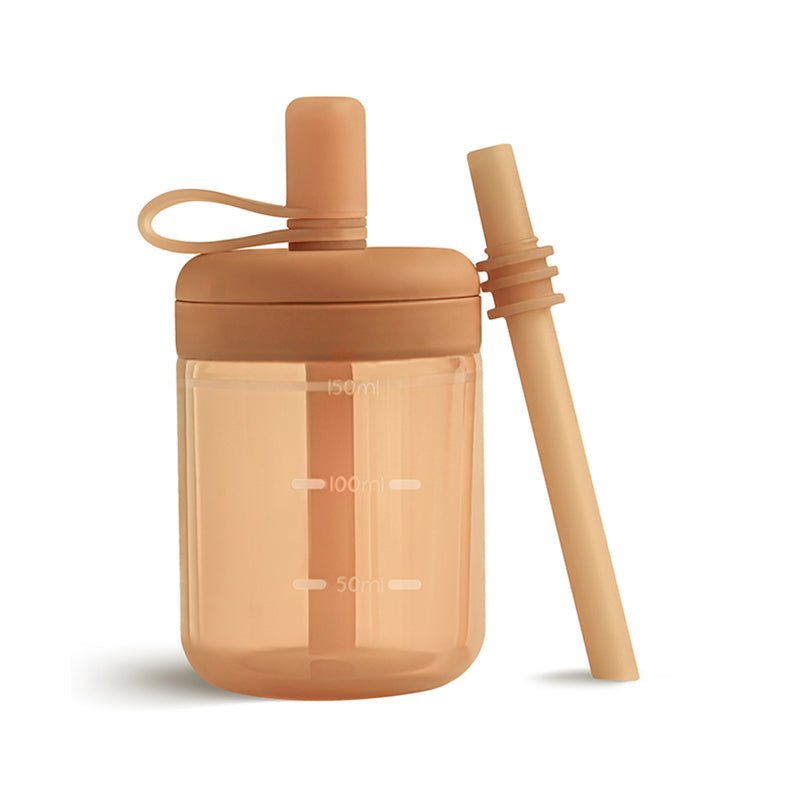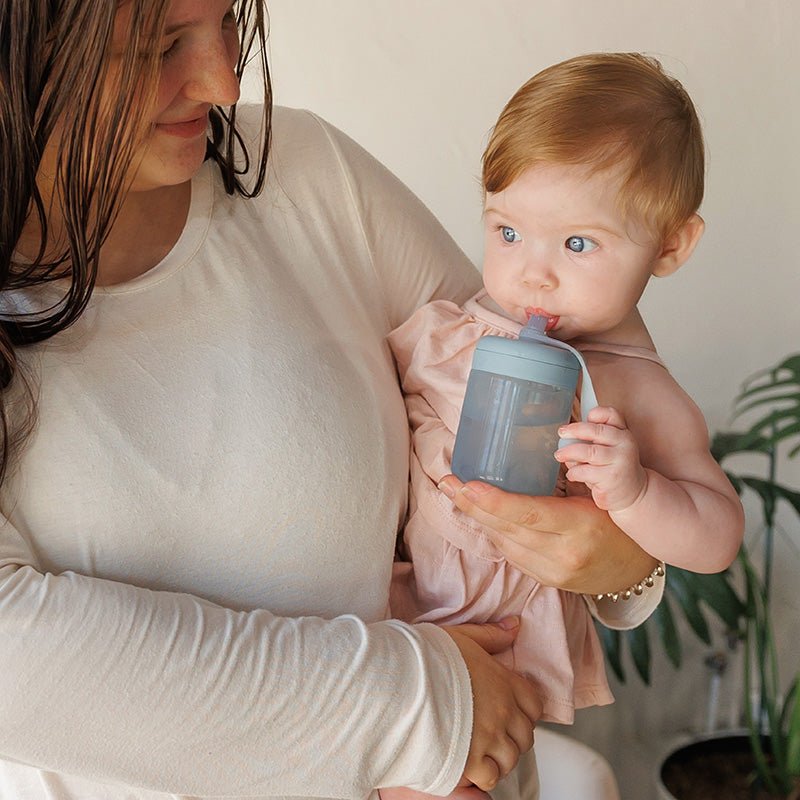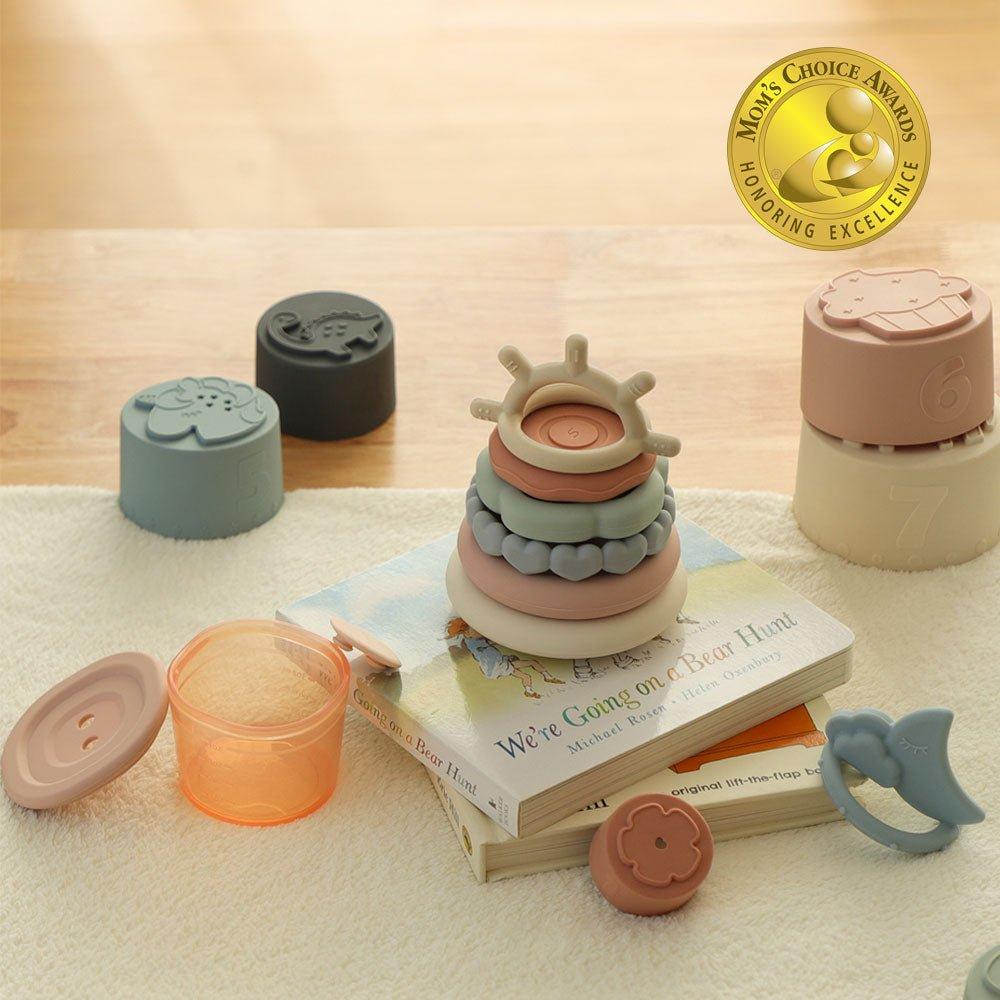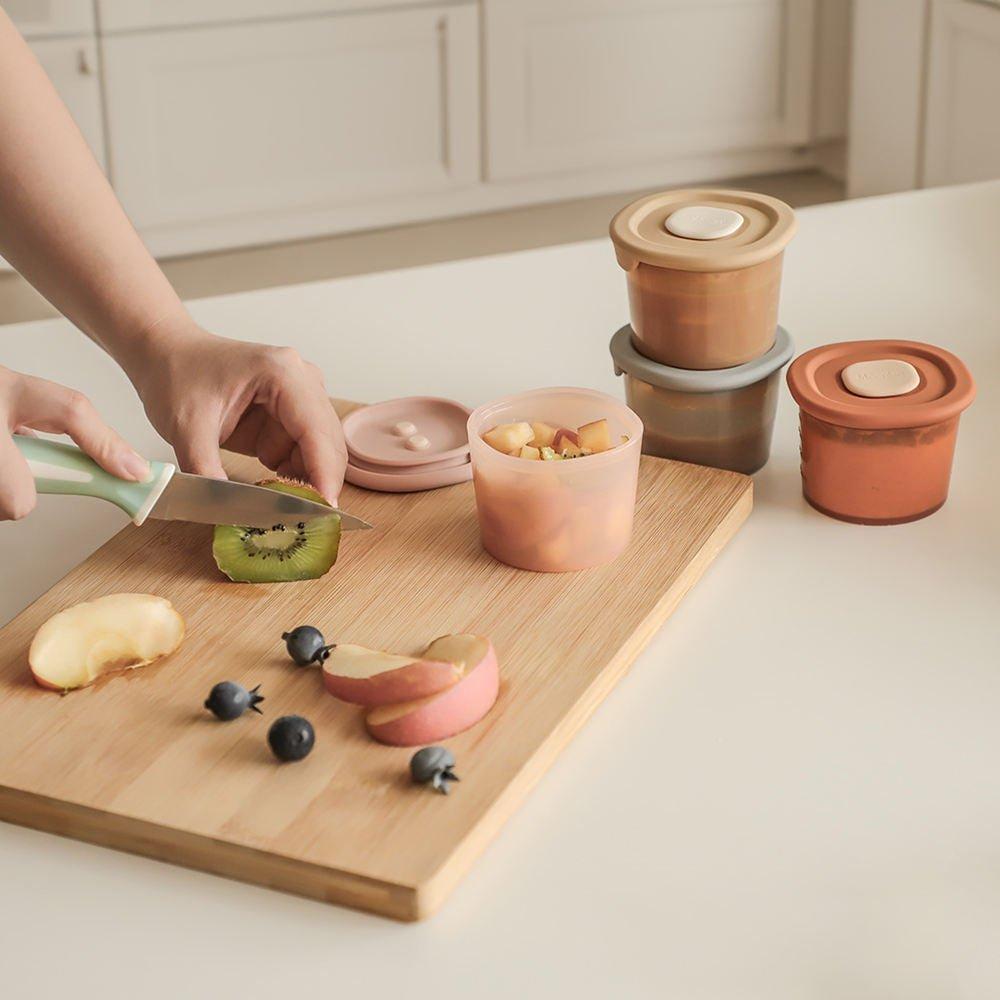I've been around the block of child development a few times as a mother and foster parent, but each new baby or toddler in my care inspires more questions and research!
The early stages of child development are intense, and parents play a key role in fostering each stage. Knowing the developmental milestones your child instinctively strives for, while also recognizing his struggles, feelings, and desires, makes you a more patient and understanding parent.
Through years of research, parenting, and doctors' visits, I've zeroed in on seven key things every parent should know about early development, as well as 75+ answers to the questions parents tend to ask during the first 4 years.
In This Article
7 Things Every Parent Should Know About the Early Stages of Child Development
Every parent should understand the early stages of child development to inform their parenting, lifestyle choices, home styling, discipline tactics, toy selection, and educational decisions. The more parents know, the better equipped they are to give their child the best start.
Babies are incredible! They build 1 million neural connections every second until they are 3 years old (source). And by age 5, your baby will have formed 90% of all the neural connections she will ever make (source).
Before we get into 75+ questions that parents commonly ask in each stage of their children's incredible early development, here are seven things they should know overall.
1. Babies Are Born With an Innate Ability to Learn
Babies, even newborn babies, can learn and retain information (source). From the moment they are born, babies absorb information about their environment and the people around them like a sponge!
Since babies learn through their senses of sight, sound, touch, taste, and smell, it is crucial to show your little one a variety of sights, sounds, and experiences. However, it is easy to overdo it!
In those first weeks, your newborn will learn a ton just by being cared for and interacting with parents and family. As your little one's sensory skills improve, she will begin to fixate on objects farther away, respond to your tone of voice, and seek to be held or comforted by certain people.
However, as your infant grows physically and in skills, she will need you to provide opportunities to explore. Otherwise, she will get herself into trouble!
We talk extensively about how you can educate your little one in ways that support her learning at each developmental stage in Early Childhood Skills and Montessori Education: What You Should Know.
2. Social Interactions Are Crucial for Development
We all know babies and young children need social interaction to develop social, emotional, and cognitive skills. However, many parents are not aware of how crucial their role is in helping their child develop fundamental language skills, all-important emotional intelligence, and useful problem-solving abilities.
Your little one needs you to talk to him, play with him, and interact with him to learn. Of course, interacting with others is necessary, too, but that connection with parents is by far the most vital connection for babies to learn social, emotional, and language skills.
By spending part of your day, or smaller blocks throughout the day, playing with your little one away from devices and distractions, you will work wonders for your baby's social development. Add playdates outside, at friends' houses, in the library, or in other group settings to increase social interactions.
3. Play Is Essential for Brain Development
Play is not just a way for children to have fun; it's also fundamental for their brain development and starts from birth! Play helps little ones develop their imagination, creativity, and problem-solving skills. It also helps them learn how to regulate their own emotions and interact with others (source).
Playing is all about sensory exploration and social connection at first. Giggling at your silly sounds and faces, grasping random things within reach, chewing on whatever is in hand, babbling to that other baby in the mirror, and all the other activities your baby does for play are integral to building foundational skills.
As your little one progresses through rolling over, pushing up, rocking, crawling, pulling up, cruising, and walking, new areas of your home come within reach, and new abilities allow further exploration.
As such, you will find that your little one will not stick to one area, fascination, or pattern for long — she will move on to explore new things constantly!
Have you ever heard an adult look at a child and say, "I wish I had half your energy"? With that little brain growing and learning exponentially, it's no wonder your little busy bee keeps going!
4. Every Child Develops at Their Own Pace
With all we know today about babies and child development, researchers have developed growth charts, percentiles, developmental patterns, and lists of milestones to look for at each stage of a child's development. However, you must remember that every child develops at their own pace.
Your little one is unique with his own personality, genetic makeup, and gut microbiome. In fact, your host genome is 99.9% identical to your child's (and that of other humans), but your gut microbiome differs by 80-90% (source).
Add to biological diversity differences in environment, parenting, discipline, resources, nutrition, and countless other factors, and you can see why every child develops differently!
Should I Worry If My Baby Doesn't Meet a Developmental Milestone?
Milestones like rolling over, crawling, and walking are essential, but not every child reaches them at the same time. Your pediatrician is well aware of this, so you will find that your pediatrician will not worry about one skill being a bit "late."
Instead, your pediatrician will express concern if your little one is "behind" in multiple skills. To give you a basic idea of what pediatricians look for and ask about at each checkup in the first year, here is a chart compiled from the Centers for Disease Control and Prevention's (CDC) milestone lists (source).
| Skill | Age in Months | ||||
Social and Emotional Milestones |
2 |
4 |
6 |
9 |
12 |
| She calms down when you speak to her or pick her up. | ✓ |
||||
| She looks at your face. | ✓ |
||||
| She seems happy to see you when you walk near her. | ✓ |
||||
| She smiles when you talk to or smile at her. | ✓ |
||||
| He smiles to get your attention. | ✓ |
||||
| He giggles when you try to make him laugh. | ✓ |
||||
| He looks at you, moves, or makes sounds to get or keep your attention. | ✓ |
||||
| She knows familiar people. | ✓ |
||||
| She likes to look at herself in a mirror. | ✓ |
||||
| She laughs fully. | ✓ |
||||
| He becomes shy, scared, or clingy around strangers. | ✓ |
||||
| He shows lots of facial expressions for common emotions. | ✓ |
||||
| He looks at you when you call his name. | ✓ |
||||
| He reacts when you leave (searches, cries, reaches, etc.). | ✓ |
||||
| He smiles or laughs when you play peek-a-boo. | ✓ |
||||
| She plays simple social games with you. | ✓ |
||||
Language and Communication Milestones |
2 |
4 |
6 |
9 |
12 |
| He makes sounds other than crying (exhaling, gurgling, whining, etc.) | ✓ |
||||
| He reacts to loud sounds. | ✓ |
||||
| She makes cooing sounds like "oooo" and "aahh." | ✓ |
||||
| She makes sounds when you talk to her. | ✓ |
||||
| She turns her head to the sound of your voice. | ✓ |
||||
| He takes turns making sounds with you (babble conversations). | ✓ |
||||
| He sticks his tongue out and blows. | ✓ |
||||
| He makes squealing noises. | ✓ |
||||
| She makes a variety of sounds like "mamama" and "dadadada." | ✓ |
||||
| She lifts her arms up to be picked up. | ✓ |
||||
| He waves bye. | ✓ |
||||
| He calls a parent "mama" or "dada" (or a different name) regularly. | ✓ |
||||
| He understands "no" and hesitates briefly or stops when you say it. | ✓ |
||||
Cognitive Milestones |
2 |
4 |
6 |
9 |
12 |
| She watches you when you move. | ✓ |
||||
| She looks at a toy or object (like the ceiling fan) for several seconds. | ✓ |
||||
| He opens his mouth when he is hungry and sees his mom's breast or bottle. | ✓ |
||||
| He looks at his own hands with interest. | ✓ |
||||
| She reaches to grab a toy she wants. | ✓ |
||||
| She puts things into her mouth to figure them out. | ✓ |
||||
| She purses her lips to show that she doesn't want any more food. | ✓ |
||||
| He bangs two things together purposefully. | ✓ |
||||
| He looks for objects when they are dropped out of sight. | ✓ |
||||
| She looks for things she saw you hide, like a toy behind the couch. | ✓ |
||||
| She puts things into a container, like a ball in a box. | ✓ |
||||
Movement and Physical Development Milestones |
2 |
4 |
6 |
9 |
12 |
| He holds his head up when he's on his tummy. | ✓ |
||||
| He moves both arms and both legs. | ✓ |
||||
| He opens his hands briefly. | ✓ |
||||
| When you are holding her, she holds her head steady without your support. | ✓ |
||||
| She holds a toy when you put it in her hand. | ✓ |
||||
| She uses her arms to swing at objects or toys. | ✓ |
||||
| She pushes up onto her elbows when lying on her belly. | ✓ |
||||
| She brings her hands to her mouth. | ✓ |
||||
| He rolls from belly to back on his own. | ✓ |
||||
| He pushes up with straight arms when on his belly. | ✓ |
||||
| He leans on his hands for support when sitting. | ✓ |
||||
| She sits up on her own. | ✓ |
||||
| She can sit without support. | ✓ |
||||
| She moves things from one hand to the other. | ✓ |
||||
| She uses her fingers to scrape food toward herself. | ✓ |
||||
| He pulls up to stand. | ✓ |
||||
| He cruises (walks by holding onto things). | ✓ |
||||
| He drinks from a cup without a lid with your help holding the cup. | ✓ |
||||
| He picks tiny things up with his thumb and pointer finger. | ✓ |
||||
You can go to the CDC's "Milestones" page for lists of milestones through to five years old. If you have any questions or concerns about your little one's development, ask your pediatrician.
Don't worry if your baby skips crawling entirely or begins babbling syllables at 10 months instead of 9 months. As long as your wee one is thriving, eating and sleeping well, and taking an interest in exploring and communicating with you, he's fine. He's just marching to the beat of his own drum!
5. Sleep Is Important for Development
Sleep is vital for your baby's growth and development. Babies and young children need A LOT of sleep---up to 17 hours a day for newborns! With so much growth going on in your little one's mind and body, sleep functions as the "consolidator" for all that a baby learns throughout her waking hours.
Sleep, especially deep sleep, is known to support brain growth and memory consolidation. In deep sleep, brain waves slow down, allowing your little one's memories of social interactions, sounds, learned skills, and so on to be transformed into a long-lasting form that will serve as a foundation for related information later (source).
If a baby doesn't get enough sleep (cholic, sickness, caffeine through mom's milk, etc.), then she may try to eat more, fuss more often, or struggle to concentrate on something at hand.
How Much Sleep Do Babies and Toddlers Need?
According to the National Sleep Foundation (NSF), the hours of sleep a little one needs is determined by age and health, but it is not an exact science (source). Everyone is different!
Here are the NSF's guidelines on sleep for the early years. Use these as a guide rather than a strict rule.
Age |
Suggested Hours of Sleep |
Newborns (0 - 3 months) |
14 - 17 hours total (night and naps) |
Babies (4 - 11 months) |
12 - 15 hours total (night and naps) |
Toddlers (12 - 24 months) |
11 - 14 hours of sleep (night and naps) |
Preschoolers (3 - 5 years) |
10 - 13 hours of sleep (night) |
6. Proper Nutrition is Crucial for Baby's Growth and Development
You've probably heard the saying, "What goes in is what comes out," in reference to the media content we consume daily. You can apply this principle to nutrition, too, though not in the obvious sense. The quality of the food you feed your child matters because it feeds your little one's rapidly building cells.
In the first six months, breast milk or formula provides adequate nutrients for your baby to grow. However, around six months old, your little one will need more iron than milk provides, so you will need to start introducing solids. For a guide on how to do that, read Introducing Baby to Solid Food: When to Start, What to Try, and How to Begin.
As your little one grows, expand his palate by introducing a variety of healthy foods to ensure he gets all the nutrients he needs. Remember: The quality of the calories your little one eats is far more crucial than the calorie quantity.
For example, a burger and fries give a lot of calories, but they do not serve your child's body as well as veggies and chicken would. Initially, you won't have to worry about convincing your baby to eat quality calories, especially if he sees you eating them, too. Later, you can explain how the body functions better with healthy food.
Generally speaking, you want to put 30 plant-based foods in your little one's diet (and yours) each week. Yeah, that many! This way, you and your little one's gut microbiome will have a variety of nutrients to pull from to build a healthy mind and body while staving off disease (source).
Don't know where to start on a budget? Check out our guide: The Ultimate Guide to Simple Fresh Baby Food Recipes You Can Store in the Freezer.
7. You Play a Key Role in Your Child's Development
Not to be cheesy, but you are your little one's key to healthy physical, emotional, social, and cognitive development. As the parent, you are responsible for the quality and quantity of input your little one gets in exploration, discovery, nutrition, sleep, play, and social interaction.
Your love, attention, and guidance can help your child grow into a happy, healthy, and well-adjusted adult. And yes, that means taking care of yourself too! You bring your little one joy, but you also bring her other emotions to reflect.
Whether you like it or not, you are being watched and studied by that brilliant baby. And you may not realize just how much until that mini you starts walking and talking just like you do now. You set the standard and the rules, so be mindful and intentional.
And one more thing: Don't miss out on this miracle growing in front of you. I know it's hard and long and full of ungratefulness, but the seeds you plant now will turn to fruit years from now, and you may miss this time dearly. Enjoy the journey! These are the longest yet shortest years you'll ever live.
25 Questions First-Time Parents Ask About Their Newborn
Having questions about your newborn is expected and healthy for first-time parents. You'll never know if you don't ask! A newborn's safe arrival is wonderful, but those first days typically unleash an endless stream of questions, even if you read up on baby knowledge during pregnancy.

Having been through the newborn stage a few times myself, I've narrowed all the questions I had down to the ones I didn't have a satisfactory answer for, and those my newborns surprised me with.
1. How Often Should I Feed My Newborn?
Each of my newborns threw me for a loop with this one because the standard answer is to feed a newborn every 2-3 hours, including overnight (source). However, newborns grow at breakneck speed, which burns a lot of calories, so that 2-3 hours looks more like every hour most of the time.
And that's every hour from the start of one feeding to the beginning of the next feeding. Yep, at times, you may have a grand total of thirty minutes between feedings (cluster feeding)!
Does Breastfeeding Always Hurt This Much?
Thankfully, no! The first two or three weeks are awful and painful, but a lot is going on. Your body is adjusting hormones, shedding water weight, healing from delivery, and making milk, while your newborn is recovering from birth and adjusting to life outside the womb while learning to latch and drink efficiently.
It takes a while to get it down, but breastfeeding will not always hurt. Before long, you will be feeding your newborn nearly effortlessly!
2. Is It Normal for My Newborn to Sleep Through Feedings?
Yes and no. At the hospital, the nurses will wake your newborn if he sleeps past the three-hour mark because newborns shed 7-10% of their body weight in the first few days after birth (source).
This makes sense because your baby has constant nutrients in the womb but must adjust to regular feedings after birth. Also, your milk usually takes a few days to come in. First, you will have colostrum, which is super thick and nutritious for jump-starting your infant's gut microbiome and immune system (source).
Once your milk comes in, your newborn should begin gaining weight so that he surpasses his birth weight by week two. By that time, sleeping through a feeding now and then is normal, but your newborn's feeding schedule will ebb and flow quite a bit in the first three months.
3. What Should I Do If My Baby Falls Asleep During Feedings and Eats More Often?
Some newborns fall asleep nearly every time they eat. If it happens within the first five or ten minutes of a feeding, then they are likely to wake hungry within an hour and repeat the cycle. This is a vicious cycle that can last throughout the night. What can you do?
If this happens before you and your newborn settle into a decent groove with breastfeeding, just hang on and feed your little one whenever she roots around or sucks on her hand in search of milk. You could use a pacifier as well, but a pacifier may throw off crucial breastfeeding skills this early.
After we were well established, I found that pumping milk and switching to a bottle made my newborns stay awake long enough to eat well and sleep more fully. When bottle-feeding, whoever was holding the bottle could adjust the baby's position more frequently to keep the baby awake longer.
I didn't do this all the time because breastfeeding is more convenient time-wise and more consistent for nursing, but pumping milk to break up cluster feeding cycles was a lifesaver as a working mom!
4. How Can I Tell If My Baby Is Getting Enough Milk or Formula?
Baby formula is easy because you can simply prepare the amount indicated on the can for your newborn's age and weight. One way to tell if your baby is getting enough milk or formula is by monitoring his weight gain. A healthy newborn should gain around 5-7 ounces per week (source).

You can also count diapers. She should have six or more wet diapers per day and at least three poopy diapers. The number of diapers will decrease over time, especially after the three-month mark, but in these first weeks, expect 9 to 12 diapers a day.
5. How Can I Treat Diaper Rash?
Diaper rash is inevitable, so go ahead and buy some zinc oxide diaper cream for your baby's diaper bag and changing station. Left unaided, diaper rash can become an open sore or an infection within hours, so stay on top of these!
Treat diaper rash by:
changing dirty diapers as soon as possible
gently cleaning the diaper area
using a warm, wet washcloth or fragrance-free baby wipes
applying a thick layer of zinc oxide diaper cream to the area
If the diaper rash doesn't go away after three or more days, or if it becomes an open sore that won't heal or spreads, call your pediatrician. If the rash becomes infected or your baby develops a fever, blisters, or pus draining from the rash, call your pediatrician (source).
6. What If My Baby Hasn't Pooped In a While?
Your newborn (0-3 months) should be pooping 1-3 times a day, so if he doesn't poop for 24 hours, then you need to call your pediatrician. Your baby may not be eating enough or be constipated, but this situation can quickly get out of hand and cause a fever (source).
After the three-month mark, it is normal for breastfed babies to drop back to one poopy diaper a day and later back off to one every two days. Your baby will show signs of discomfort if he is constipated: fussing, not sleeping, and a tight abdomen. Your pediatrician will likely suggest a little prune or apple juice to get things moving again.
7. How Do I Bathe My Newborn?
You can give your newborn a warm sponge bath until her umbilical cord stump is gone, usually around 1-2 weeks. After that, you can bathe her in a baby bathtub or a sink filled with warm water.
Be sure to support your baby's head and neck, and use a mild soap. Your newborn likely doesn't need to be bathed daily; watch her skin to ensure you are not drying her out. Two to three baths a week is plenty. Invest in a newborn bath seat if you are nervous about holding your baby while bathing her.
8. How Do I Care For My Newborn's Umbilical Cord Stump?
Keep the umbilical cord dry and clean. You can use a clean cotton swab dunked in rubbing alcohol to clean the area around the stump, especially if some pee or poop rides up the front of the diaper.
Fold the front of your baby's diaper down to keep the stump exposed until it falls off. Your baby won't be bothered by sleeping on his belly or doing tummy time, but you shouldn't try to pull the stump off.
If the area around the stump becomes red and swollen, pus begins draining from under the stump, or your newborn develops a fever, take your newborn to the pediatrician to check for infection.
When Will the Umbilical Cord Stump Fall Off?
The umbilical cord stump normally falls off within 1-2 weeks of birth. Don't pull or rub it off; it will come off on its own.
Your pediatrician will take a look at the umbilical cord stump during your hospital stay and your first checkup a week later. The stump should have come off on its own by your one-month checkup.
9. How Can I Soothe My Fussy Baby?
Some nights, you may feel like you are at your wits' end trying to figure out why your newborn is crying. You can try rocking, swaying, singing, talking, giving a pacifier, or walking in the stroller.
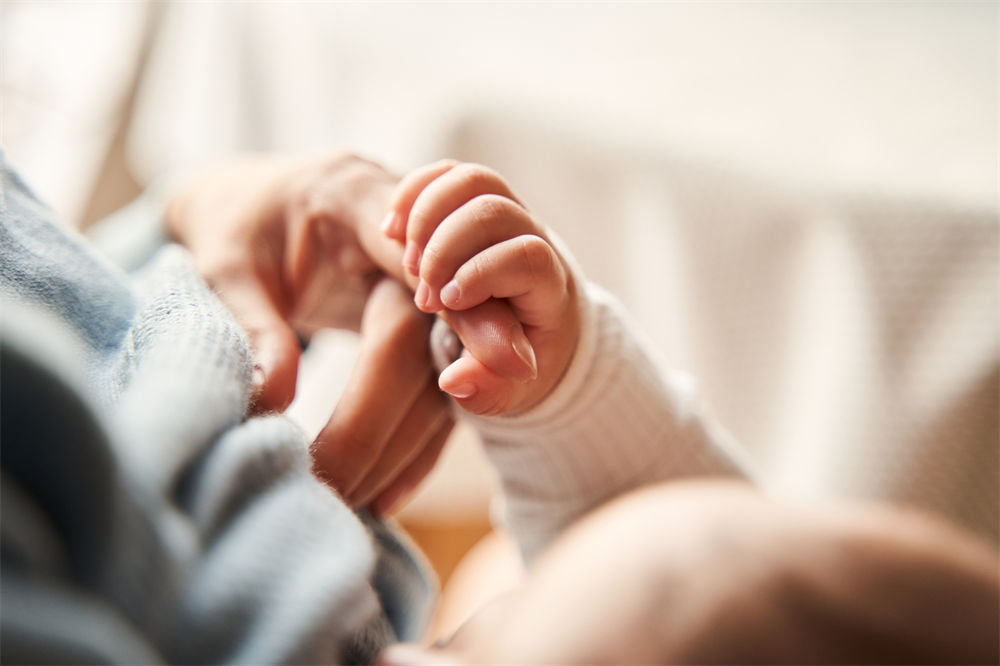
Here are a few ways I've used to calm fussiness in newborns:
wrapping the newborn in a snug swaddle, cradling, humming, and patting the baby's butt
putting the newborn in a sleep sack instead of a sleeper
pumping the baby's legs to get gas moving and calm gurgling in the gut
holding the newborn so that she can see and walk around, talking about things
letting the newborn suckle until she falls asleep
Every baby is different, so you may need to try various methods to find what works best for your little one.
10. How Long Should My Baby Sleep Each Day?
Newborns sleep a lot--even up to 16-17 hours per day. This sleep is usually broken into short periods of a few hours each to make room for frequent feedings and bowel movements, even at night.
Though newborns sleep so much, it takes a while for them to adjust to sleeping at night. While in the womb, newborns tend to sleep while Mommy moves around (lulled to sleep) and wake up when Mommy sits or lies down. Your newborn is still on that schedule after birth, so don't be surprised if he is wide awake at 3 am!
At first, your newborn will spend only a short time awake, observing his surroundings. But that awake-and-alert time will increase steadily over the first months, as will nighttime sleep compared to daytime sleep.
11. How Can I Help My Baby Sleep Through the Night?
There's no one-size-fits-all answer to this question, as every baby is different. Some tips that may help your baby sleep through the night include establishing a consistent bedtime routine, creating a calm and quiet sleeping environment, and avoiding overstimulating your baby before bedtime.
Things like TV, loud music, shouting, lots of people around, and seeing many new things right before bed should be avoided, as they are overstimulating.
Nonetheless, do not expect to get more than 4-6 hours of solid sleep at night for the first three months after birth. Your newborn will need to eat, pass gas, poop, and be soothed every 2-3 hours during the first two months and 3-4 hours during the third month.
12. When Should I Start Making My Newborn Stick to a Schedule?
Sleep training for naps and longer nights can start as early as 4-6 months of age, but it's helpful to talk to your doctor to make sure your baby is developmentally ready.

My family's approach was to keep the baby awake after the afternoon nap, cook and eat dinner by 6 pm, do bathtime, read a book while nursing the baby, and settle into bed by 7:30 pm every night. This rarely interrupted evening routine helped signal bedtime for my babies (the second baby learned faster with a toddler to follow).
For naps, we had routines for breakfast and lunch to encourage the mid-morning and afternoon naps. There are many different sleep training methods, so you may want to talk to a doctor or sleep specialist to find the best approach for your family.
13. What Should I Do If My Baby Has a Fever?
If your baby has a fever, you should contact your doctor right away. In the meantime, you can help keep your baby comfortable by nursing often, dressing her in lightweight clothing, and giving her infant acetaminophen or infant ibuprofen as directed by your doctor.
Your baby may be inconsolable when fevered, but your attitude, patience, and calmness are necessary to get her to sleep. Sleep and milk will help your baby through the most common illnesses.
When Should I Call the Doctor About My Baby's Symptoms?
You should call your doctor if your baby has any symptoms that concern you, such as fever, vomiting, diarrhea, difficulty breathing, or a persistent rash.
It's better to be safe than sorry!
14. Should I Let My Baby Get All the Vaccinations?
You should start thinking about your baby's vaccinations before she's born. Talk to your doctor or pediatrician about the recommended vaccination schedule and any concerns you may have. Do research and reach out to other doctors and experts as well to get other opinions.
If you are leery of vaccinations, consider the risks for your baby not getting vaccinated. Are those risks worth taking? Moreover, consider where your child will attend school. Most public schools require proof of vaccination, so declining vaccines now may affect where your baby will attend school later.
Learn about the baby vaccine schedule in the United States and your rights as a parent in A Quick Guide to Baby Vaccinations in the U.S.
15. When Should I Start Tummy Time With My Baby?
You can start practicing tummy time with your baby from day one, as long as he is supervised and awake. Aim for a few short sessions each day, gradually increasing the time your baby spends on his tummy.

Don't do tummy time right after eating or before burping; that makes a big mess! Your newborn won't like tummy time much, but it's crucial for building neck and back muscles. Besides, tummy time helps move gas along!
Check out From Teething to Tummy Time: The Top Sensory Toys for Every Stage of Babyhood for tummy time toy ideas!
16. Can I Use a Chest Carrier With My Baby Before She Can Hold Her Head Up?
No, avoid carrying your baby in a chest carrier until she can hold her head steady on her own. Otherwise, she won't be able to stabilize her head while you walk around, which could cause a strain on her neck. Most babies can start riding in a chest carrier around 4-6 months old.
Once your baby can ride in a chest carrier, it becomes tempting to use it all the time. However, be mindful of your little one's legs as blood circulation may be cut off, or she may become sore sitting with her legs on either side of the seat. 30-45 minutes is long enough for a baby who fits the carrier well.
17. Is There Such a Thing As Too Long in the Baby Swing?
Yes! If you read the instructions on the box, you will probably see that the swing designers suggest no more than 30 minutes at a time in the swing. Moreover, the AAP says you shouldn't use the swing for more than an hour a day, divided into two 30-minute sessions (source).
The fear is that your infant's soft head can begin to flatten. Besides, your baby won't always have a swing around to fall asleep in, so it's better that you don't get used to it.
18. Is It True That Rocking My Newborn to Sleep Will Make Him Need Rocking Every Time?
Everyone seems to have an opinion on this! Many are afraid that rocking their newborns to sleep will result in the baby requiring rocking to fall asleep well into the toddler years. Others claim that rocking is a sweet and comforting time that is well worth the hassle.

The verdict? Two studies have shown that rocking babies may help them fall asleep faster and promote brain function, but these studies need follow-up studies (source).
19. Can I Give My Newborn Water?
No! Do not give your newborn water until your pediatrician gives you the green light, around 6 months old. Newborn bellies and kidneys need only breastmilk or formula because they use everything they get to grow and build millions of neural connections.
Giving your newborn water will flush them out, cause nutrient loss, and cause water intoxication (source). Newborns can only have a couple of ounces of fluid in their belly in the first few weeks, and that grows to about seven ounces by 6 months old. That space needs nutrient-dense milk, not water.
If you are worried about hydration, rest assured that your little one will get all the hydration he needs through breastmilk or formula until he is weaned or a year old. As for juice, avoid giving it to your baby until after his first birthday unless your pediatrician recommends it.
20. Can I Let My Newborn Try Sauces?
It is best to avoid giving your newborn sauce taste tests until she is around 4-6 months old. A newborn's gut is incredibly delicate early on, so wait to make those fun introductions until she is food-ready.
Also, DO NOT give your baby honey until after her first birthday (some doctors recommend waiting until two) because it has a bacteria that causes infant botulism (source). Infant botulism causes weakness in muscles, sucking, crying, and causes constipation.
21. How Can I Help My Baby's Eczema Clear Up?
Some little ones develop eczema, a skin condition that causes dry, itchy patches. Aside from discomfort, constant itching can break the skin, letting in unwanted bacteria. Your pediatrician will likely prescribe a steroid cream for breakouts and suggest putting socks over your baby's hands to prevent deep scratches at night.
Eczema can be caused by genetics, environmental irritants, or both. One long-term strategy to minimize potential breakouts is to simplify the chemicals you use in cleaners, detergents, diapers, wipes, and candles. You can find each of these things made with natural ingredients easily these days.
I had to switch to cloth diapers and homemade wipes for my babies because they had breakouts every week. When I changed everything--diapers, wipes, detergents, soap, and cleaners--over to natural ingredients, breakouts only happened when they sweated a lot outside. Read Going Green: How to Create a Sustainable Home for Your Family for more!
22. Is It Okay to Let My Baby Sleep With Me?
You can, but it's better to be safe and place your newborn in a bassinet or crib next to your bed. The chances of you rolling over onto your newborn while sleeping hard are too high and not a risk worth the convenience of having your baby right there for night feedings.

You can hold your baby on top of you in a recliner that you are unlikely to roll over in, if you would like. I had to do this often with one of my babies, who was unable to keep milk down while lying on her back.
23. Should I Keep Nursing My Newborn When I Have Mastitis?
As painful as it is, you should keep nursing your newborn when you have mastitis. Mastitis is inflammation of a mammary gland that may also involve a bacterial infection when milk remains in the gland too long.
Letting your newborn suckle or nurse may help get the milk flowing through the affected gland again, easing your pain and curing mastitis. Not getting that milk flowing could lead to an abscess or to the cessation of milk production (source).
You can also try pumping milk, but some electric pumps hurt even more than nursing. If you don't have a pump yet or need a quieter option at work, check out our gentle, silent hand pump.
24. Can My Baby Taste Different Foods I Eat in My Milk?
Kind of! Infants can detect strong flavors like garlic, carrot, eucalyptus, mint, anise, and vanilla in breast milk within hours after you eat them. Your baby can pick up on other flavors too, but it's not clear how much (source).
By eating a variety of foods, you can introduce your baby to many flavors!
25. Is It Normal to Become Angry or Feel Overwhelmed With My Newborn?
Yes, it is totally normal to feel angry or overwhelmed with your newborn, but it should not lead to thoughts of harming yourself or your baby. Likewise, you should not yell at or roughly handle your newborn. If you feel a tendency to do so, reach out to your pediatrician or confide in a counselor or therapist.
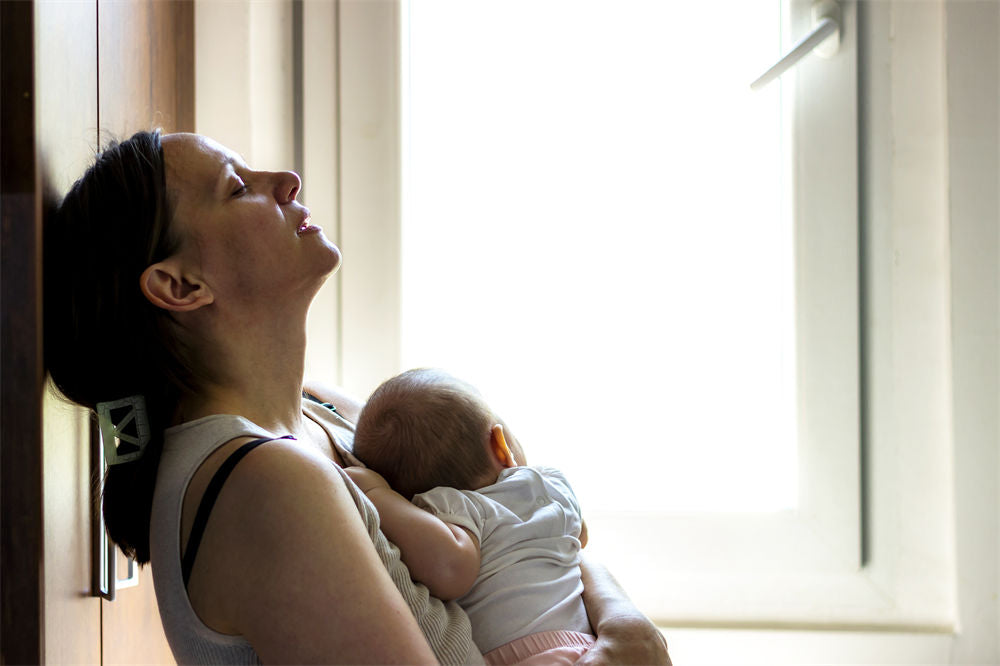
You've got to deal with such thoughts before you act on them and cause irreparable damage to your newborn physically, emotionally, socially, or mentally. If such thoughts happen in your mind daily, you may have postpartum depression. Talk to your doctor to get it handled quickly.
Learn more about taking care of your baby as you battle postpartum depression in How to Bond with Your Baby When You're Struggling with Postpartum Depression.
25 Questions First-time Parents Ask About Their One-Year-Old
Just when you feel like you're starting to get the hang of this whole baby thing, your sweet baby turns one. He will soon be walking, using more words, employing new skills to get into trouble, and zeroing in on all the goodies you've hidden. With so much change happening at once, questions pop up.
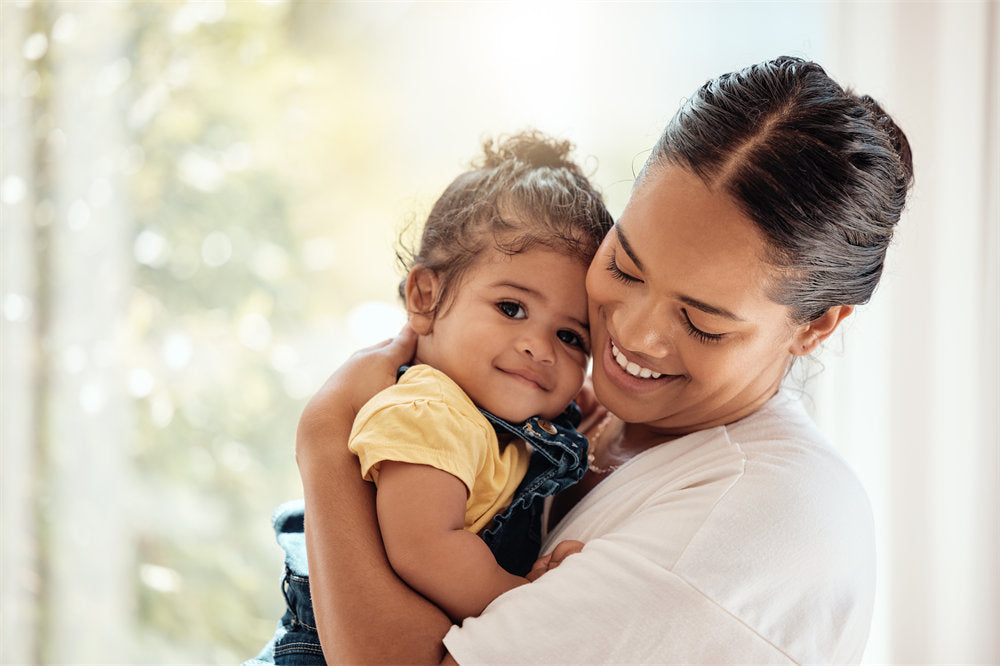
Questions first-time parents ask about their one-year-olds range from transitioning nap times to when and how to wean from breastfeeding to whether it's too early to start potty training. These are totally normal questions every parent asks at some point!
1. When Should I Start Potty Training My One-Year-Old?
Most healthy one-year-olds are ready to begin potty training sometime between 18 and 24 months old, but some toddlers fight it tooth and nail until around three years old. Your child will be ready to begin potty training when he can walk, sit, pull down his pull-up, and communicate bathroom needs.
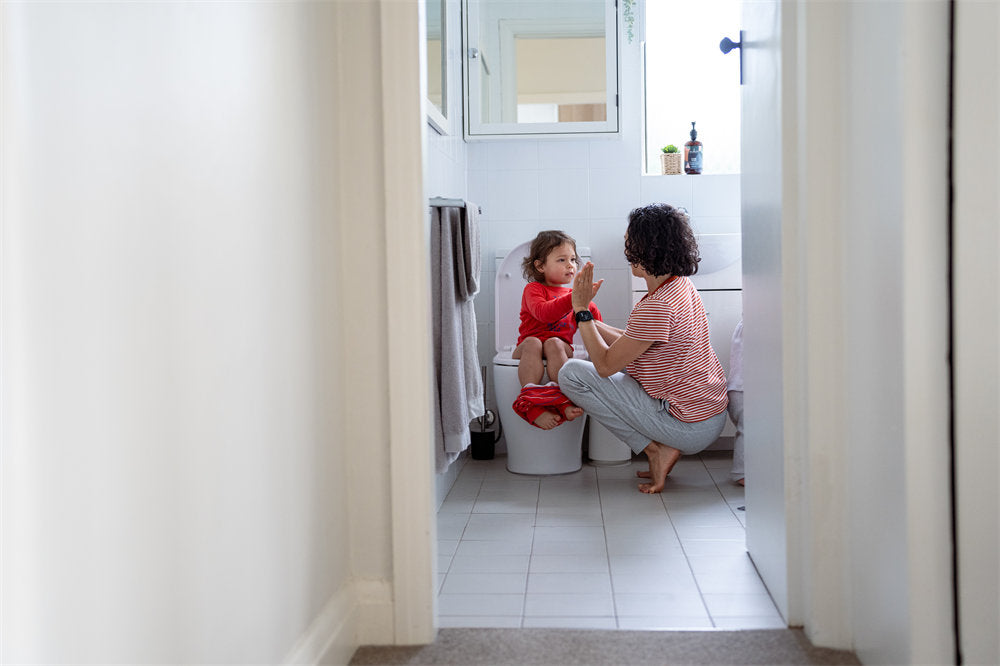
When your child is willing to be independent and please you by trying, he's ready to start potty training! But be careful about how you act and react to his successes and failures, because that will determine how potty training goes over the next few months.
Toddlers quickly realize they can only control two things: eating and using the bathroom. So, at a time when he's trying to become more independent, he may choose to be stubborn in these two areas.
How Should I Potty Train My One-Year-Old?
You can simply work with your child by setting her on the toilet before and after sleep, before meals, and before leaving home. Set a timer for 3 minutes and let your 1-year-old watch it count down before she gets off the toilet.
Give her praise for "tactical wees" even if she doesn't pee in the toilet, but really praise her for successful potty runs. When she does pee herself, explain that it isn't her fault — accidents happen.
A less child-oriented method starts when the toddler understands when she is about to pee (approximately 20 months old), controls her own bladder, and can complete all potty-training tasks herself (source).
In this method, you will teach your one-year-old bathroom phrases, show the difference between wet and dry pants, talk her through the process, show her how to clean herself up, check her pants frequently, and make her sit on the toilet every 15 minutes.
When she successfully pees in the toilet, make a big deal out of it. But if she pees herself, reiterate what she's supposed to do, withhold praise, and have her clean herself up (as taught).
Once she has a few successful runs, understands what to do, and communicates when she needs the toilet, space out the toilet times to 30 minutes, then an hour or more.
The latter method is more efficient, but some temperaments don't handle it well (too much pressure on the child or too much work for the parent). Either way, don't let your toddler tell you no and run away. She must try the toilet when you ask her to do so. Setting a timer that she can see usually helps.
Is Regression Normal in Potty Training?
Yes, it is normal for your one-year-old to start peeing himself after having several days or weeks of successful potty training. The question is why. Sometimes, it is an attempt to control something or be stubborn. Other times, it may be a strong desire to keep playing and forgetfully wetting himself.
Whatever it is, the way you react will either reinforce the behavior, upset your child, or make him feel like he can tell you when he makes a mistake or has an accident. Be gentle and calm; it will help you and your toddler in the long run.
How Do I Train My One-Year-Old to Not Pee at Night?
Most potty trainers learn to go to the bathroom during the day or night and have accidents at the opposite time. For instance, my second never wet her diaper or the bed at night in potty training, but struggled to make it to the toilet successfully during the day for months.
If your one-year-old chugs water in the evenings, wake her for a potty break before you go to bed. Once she has gone a few months without an accident, you can start waking her sooner and sooner in the evening until you don't have to wake her anymore. If she does have an accident, have her help clean up the mess.
But take a step back for a moment and think about this: is it more important for your toddler to sleep through the night without an accident or to be hydrated?
Asking her not to drink water at the end of the day so that she won't have an accident in her sleep doesn't compute in a toddler's mind. All she knows is that you are withholding water when she's thirsty.
So, instead of forcing your toddler to stop drinking water, you can wake her for a nighttime bathroom break or put her in a pull-up every night until it's no longer an issue.
2. How Much Sleep Should My One-Year-Old Be Getting?
A one-year-old should get 11-14 hours of sleep per day between daytime naps and nighttime sleep (source). Though achieving that much sleep is challenging for some one-year-olds, it is possible to achieve it by setting a habitual pre-sleep routine and sleep training.

Setting a routine is perhaps the most powerful thing you can do to help your one-year-old settle into naptime and bedtime, even when sick or teething. We dove into the benefits of routines and how to build one, specifically in The Ultimate Guide to One-Year-Old Sleep: Tips and Tricks for Busy Parents.
How Can I Get My One-Year-Old to Sleep Through the Night?
Getting your one-year-old to sleep through the night depends on the issue. Is he still breastfeeding at night? Is he hungry? Is he struggling with gas or dirtying a diaper? Perhaps he is being startled by new noises in a new place.
Once you have identified the issue, you can work on it. The basic checklist for all of these is the following:
full belly
clean diaper
fresh clothes
comfortable temperature
dark room
no unusual noises
a calming noise (box fan, noisemaker, voices in the next room)
no blankets wrapped around the body awkwardly
If all these requirements are met, check for ways to handle the specific issue. For gas bubbles, reduce the gassy foods he or you eats (baby food or breast milk) after midday and do leg exercises before bedtime, like walking around, crawling, or playing on the floor. Movement can help move that gas along before it builds up.
If your one-year-old is waking hungry at night, try adding a filling, healthy snack right before bedtime, like blended oatmeal, meat-and-veggie baby food, or a banana and milk smoothie. If waking hungry continues for another week, talk to your pediatrician.
Also, avoiding caffeinated drinks after lunchtime will reduce the chance that caffeine is in your breast milk. Other options are going for a walk or playing outside after dinner and before bedtime to wear your wee one out and ensure no screen time or over-stimulating activities happen for an hour or two before bedtime.
How to Transition Your One-Year-Old to One Nap a Day
The key to transitioning your one-year-old to one nap a day is sticking to a pre-naptime routine, being consistent, keeping your child awake at other times, and ensuring everyone settles down for a quiet time.
Sure, busy one-year-olds can pass out anywhere when ready, but naptime makes more sense when everyone else at home settles down at the same time every day. It's not like she will miss out on all the fun if she takes that nap.
When transitioning from two naps to one, phase out the first nap by gradually reducing its duration as your one-year-old can handle it,, and plan a stimulating activity for that first naptime. Typically, the morning nap is consolidated into a longer afternoon nap because that's when our circadian rhythm naturally dips.
Don't worry; with consistency and patience, the transition to one nap will happen!
3. Are There Any Foods I Should Avoid Giving My One-Year-Old?
Honey must be avoided until one year old, but you may delay it until 18 or even 24 months old to be on the safe side. Honey contains a bacteria that can cause infant botulism in baby bellies, so it's best to avoid it until the toddler's gut microbiome has matured.
Other foods to avoid include anything your one-year-old can choke on, such as grapes, chunks of meat, and raw carrots. Wait until your child's teeth have fully come in for these, or cut them into tiny pieces. Fish bones are also dangerous for one-year-olds, as they are fine and difficult to see.
4. Is It Normal for My One-Year-Old to Throw Tantrums?
Yes! Welcome to real parenting. The first year is much easier because you get to focus on keeping your baby alive, healthy, and happy. In the second year, though, you begin seeing free will, independence, and stubbornness. There's nothing like children to teach you patience!
But in all seriousness, it is normal for one-year-olds to have tantrums. They feel strong feelings that are not always tied to things they understand, like hunger and discomfort. Instead, one-year-olds experience a mix of strong emotions and cannot always tell them apart.
So, the typical one-year-old feels big feelings, doesn't understand them, cannot explain them, and cannot control them. The result is a glorious meltdown in public after you said no to something on a shelf for the fiftieth time.
Just so you know, you're not alone; tantrums happen the most from 24-36 months but happen in 87% of 18-24-month-olds, too (source). As with everything as a parent, how you react and how safe your child feels with you physically and emotionally in their fragile state will determine how your one-year-old develops emotional regulation later in life.
Learn more about handling toddler tantrums in The Ultimate Guide to Toddler Tantrums: How to Handle Them Like a Pro.
5. Should I Be Worried that My One-Year-Old Is Not Walking Yet?
No! Most babies and toddlers learn to walk within 2-3 months of learning to stand, which is typically between 10 and 18 months of age. You can talk to your pediatrician if your toddler isn't walking by 15 months old.
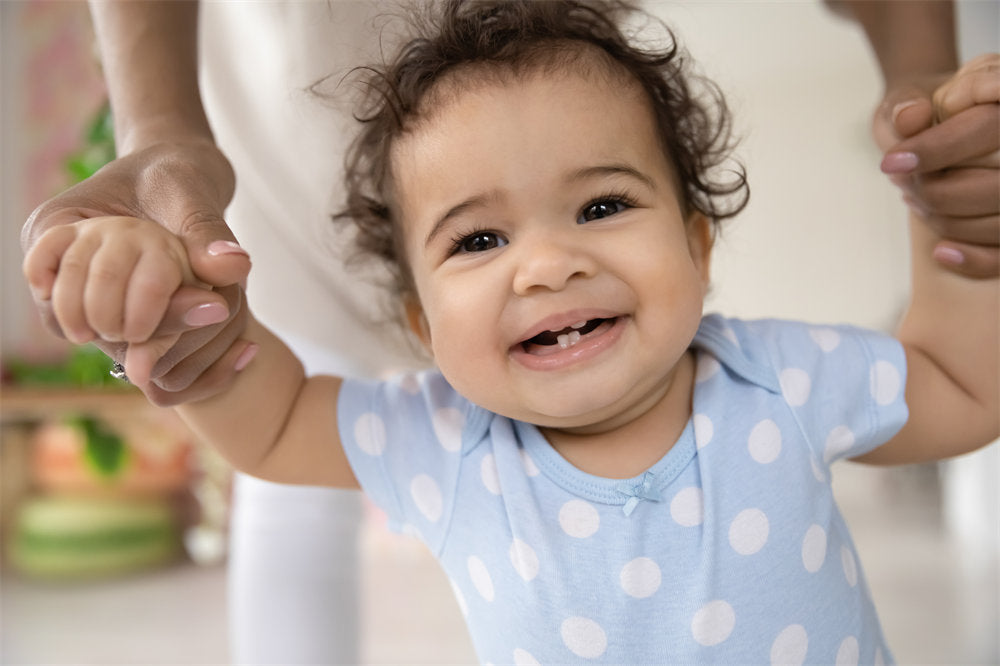
However, if she is pulling herself up, walking with walking toys, and cruising on furniture, walking independently is coming soon! But if your toddler is 15 months old and not doing any of those things, you should talk to your pediatrician to rule out any physical issues that might be hampering her progress.
How Can I Encourage My One-Year-Old to Walk?
Babies progress to walking by following a sequence of stages: rolling over, pushing up, standing on all fours, rocking, crawling, pulling up, cruising, and finally walking.
Encouraging your one-year-old to walk can involve:
a push toy
holding his hand to walk together
calling him to you while he's already up and cruising on furniture
You can even space your furniture farther apart so he has to reach farther and take a step.
6. How Much Should My One-Year-Old Talk?
Every child develops at her own pace, especially when it comes to talking. So many factors contribute to this, including how often parents spoke face-to-face with her in the first year, how frequently she heard adults speaking around her, how often she is now prompted to respond, and her unique personality.
Around her first birthday, your little one will understand a few words and signs for family members she sees daily or nearly daily, as well as for things she wants or needs often. She may even use repeated syllables to name some of those things (mama, dada, bubba, papa, gama) (source). But these names will only be understood by you.
When Should I Be Concerned About My Toddler's Speech?
By 18 months, your child will pick up more vocabulary, and by 24 months, he will know quite a few words. If he isn't using syllables purposefully by 18 months old, let your pediatrician know. If he remains quiet at 24 months old, your pediatrician may suggest a speech pathologist.
Many toddlers delay speech, especially if an older sibling speaks for them. It could be a hearing issue or simply feeling like he doesn't need to say anything.
7. How Can I Soothe My Teething One-Year-Old?
Soothe teething pain by giving your one-year-old a cold teething ring, a cool, wet cloth, or rubbing her gums with a clean finger. At Moonkie, we've designed high-quality, food-grade silicone teething rings with different patterns, textures, and shapes to help your child play and chew.
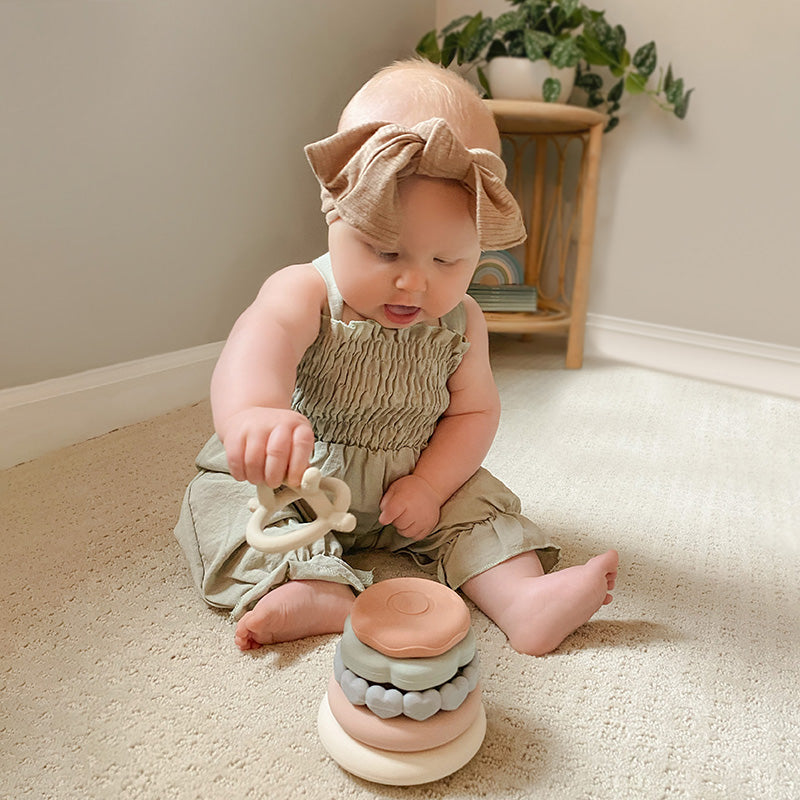
They are heavy-duty, durable, and long-lasting, too! Even better, you can chill them in the freezer before handing them to your baby and toss them into the dishwasher when she's done with them. We don't cut corners with our products!
If you're a bit apprehensive about silicone baby products, read Are Silicone Baby Teethers Safe? What You Need to Know.
When Should I Begin Taking My Child to the Dentist?
As soon as your child's teeth appear, you should begin brushing them with a baby-safe toothpaste and take him to the dentist. Call ahead to see if your dentist will work with children younger than 24 months, though.
Some dentists specialize in servicing toddlers and young children. If you are not sure, ask your pediatrician's office for phone numbers of toddler-friendly dentists in your area.
8. When Should I Switch My One-Year-Old to a Toddler Bed?
When your one-year-old begins climbing out of his crib or pack-and-play, it's time to transition him to a toddler bed. You can do this by switching either naps or bedtime sleeps to the new bed first, or letting him help set it up and put a couple of favorite stuffed animals in it.
Some toddlers switch seamlessly in one evening, while others take their time. Both routes are okay. If your one-year-old is rolling out of the toddler bed, invest in a rail.
9. What Are Some Common Developmental Milestones for One-Year-Olds?
Common developmental milestones for one-year-olds include walking, adding more syllables, expanding vocabulary in toddler-speak and sign language, learning social skills, expressing new emotions, and understanding routines and the daily questions and statements you make to her.
Physically, one-year-olds continue refining their fine and gross motor skills so that running, jumping, balancing, climbing, coloring, holding pencils with fingers instead of fists, stacking toys, and putting multiple things together become daily habits.
Mentally, one-year-olds begin to grasp cause and effect, remember and act on memories, memorize animal sounds, and problem-solve. So, if your twenty-two-month-old begins moving furniture to reach things up high, smile because she's using problem-solving skills!
10. How Can I Encourage My One-Year-Old to Be Independent?
You shouldn't have to do much for most one-year-olds because they'll take off on their own! However, if your one-year-old is extremely clingy and always needs you in sight, you can do a few things.
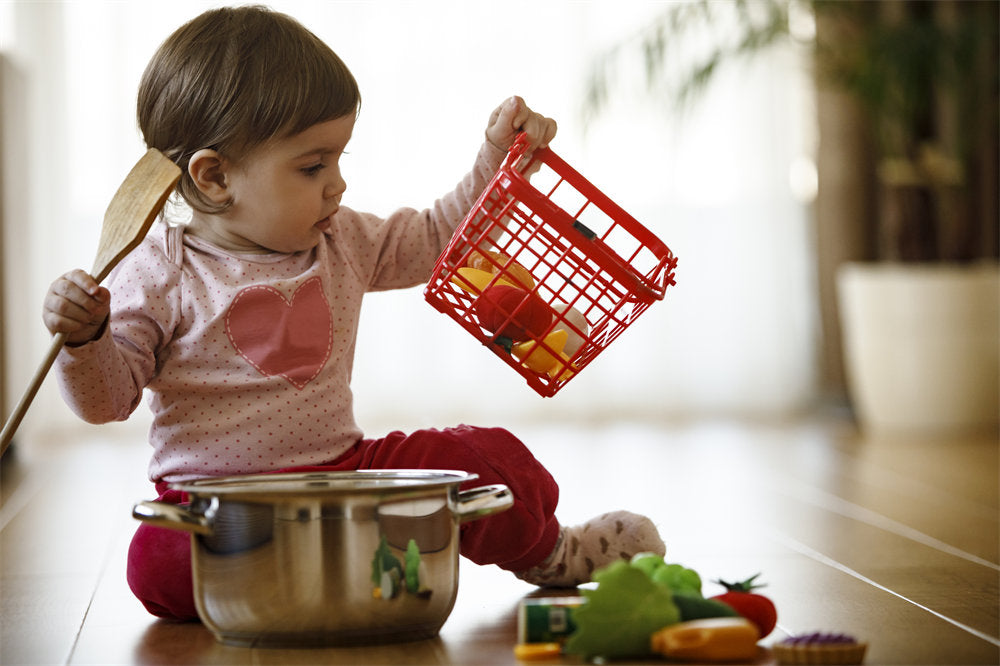
One thing you can do is not pick up your one-year-old every time he asks for it. Talk to him, look him in the eye, and assure him that you will pick him up soon, but not immediately (best to do while you're doing something).
Another thing you can do is let him play with open-ended toys or look at books for short spurts of time on his own. Praise him for whatever he accomplishes in that time, sit and play for a few minutes, and then get up to do something else.
As you go, increase the time you spend not sitting with your child. Before long, he'll go for twenty or thirty minutes!
11. What Are Some Good Ways to Discipline My One-Year-Old?
Disciplining a one-year-old looks different from family to family. Moreover, various temperaments respond differently to different types of discipline. The foundation of all discipline is your temperament in delivering discipline.
Don't yell, harm your child, shame her, drag her, push her, wrench her arm, squeeze her hard, or slap her. These actions cause toxic stress in the child, which can affect brain development and definitely affect social and emotional development.
Instead, remain calm. If you cannot, put your child in a safe place (a playpen, pack-and-play, or crib), set a timer they can see, and step out to cool off. How you handle yourself when your child crosses a line or breaks a rule significantly shapes how she will regulate herself and treat others later in life.
How you administer discipline needs to fit the "crime," but it should also be understandable to your one-year-old. Timeouts, firm pats on the butt for getting attention, gently slapping a hand away from something dangerous, or taking a toy being fought over away are all appropriate punishments understandable for one-year-olds.
Letting the one-year-old see the timer go down (a bar or a circle reducing), using a "trouble chair," and being consistent with the rules and punishments are also helpful.
Your discipline tactics can make or break a child. Learn about building resilient children in Encouraging Resilience: 7 Effective Ways to Build Resilience From the Start.
12. How Can I Get My One-Year-Old to Drink More Water?
If your one-year-old struggles with hydration, consider switching bottles, taking timed water breaks, or giving a snack that makes your child want to drink something (crackers, popcorn).
Another thing you can do is reduce the amount of any other drink your one-year-old prefers. For example, don't give him sugary teas and juices. Water is better for him anyway! You can also try adding lemon or frozen fruit to the water for him to try.
13. When Should I Start Teaching My One-Year-Old to Use Utensils?
Ideally, your one-year-old will have already been practicing using utensils, but if she hasn't yet, let her have them! It will be messy, but using utensils is a crucial skill for one-year-olds to practice to develop fine motor skills.
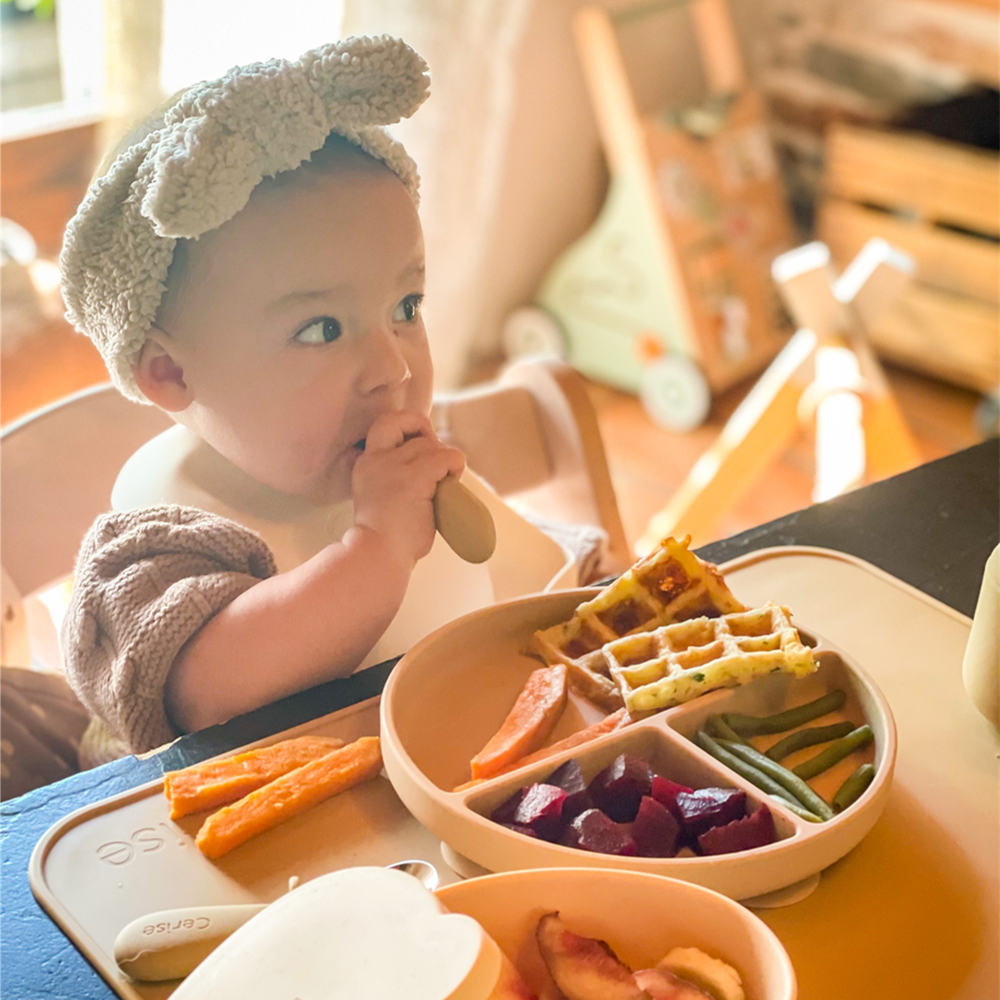
You can use Cheerios or puff snacks in a clean bowl with a spoon for easier cleanup on busy days. If you are worried about the plastic or metal spoons in most stores these days, check out our soft silicone baby feeding set!
14. What Are Some Good Ways to Encourage My One-Year-Old to Share?
Sharing is an incredibly difficult social skill for one-year-olds to learn! However, they will do what they see you do. So, make a point of sharing with your little one and other friends and family, and make a big deal of it, to show your one-year-old how to share and encourage it.
Next, provide opportunities for your child to share by asking, "Can I have one?" When he hands you something, smile and say, "Thank you so much for sharing this with me! It makes me happy. You are so sweet!"
Between kids, though, this is a challenge. Older kids snatch toys out of little kids' hands. Making a point of getting onto those older kids and having them "make it right" is crucial for showing your one-year-old the rules of the game they should be playing.
When another child wrongs your one-year-old, comfort him and help him think of something else to play with.
15. How Can I Help My One-Year-Old Develop Good Manners?
By having good manners! Young children learn social skills using a "monkey see, monkey do" method, and one-year-olds can soak up everything you do. From your facial expressions to tone of voice to body language, your one-year-old studies you when you talk to someone else.
Even if it doesn't look like it now, you will see your toddler mimic your mannerisms in the next couple of years. You have a "mini-me" watching, so have good manners with others and your child.
When your one-year-old does something rude on purpose (throwing food, slapping others, snatching, etc.), say, "No, we don't do that," and correct her. Likewise, when something happens to you that you don't like, model how to handle it well.
Learn about observational learning in Be Careful, Mommy, Daddy, What You Say: Building Your Child's Identity.
16. What Are Some Good Ways to Help My One-Year-Old Understand Cause and Effect?
The best way is to let your one-year-old figure it out himself. This is what makes Montessori or sensory toys so ingenious; they are designed to let children learn by exploring the activity and figuring it out themselves.

Recognizing cause and effect relationships is a crucial skill Montessori kids learn to observe through play. For more on Montessori and sensory toys, read Are Montessori and Sensory Toys the Same Thing?
17. How Can I Help My One-Year-Old Develop a Good Attention Span?
Helping your one-year-old develop a good attention span is more about what you don't do at first. For instance, using screens to babysit your one-year-old while you get something done is a recipe for instilling a short attention span for anything else in your child. It eventually makes entertainment and novelty necessary.
Your child's attention span will naturally increase as her cognitive abilities develop. If screens and overstimulating toys and activities don't stunt that natural development of focus, she will be able to focus on books and open-ended toys better and better.
Giving your child open-ended toys and activities, reading to your child every day, and keeping screen time to an hour or less will help your one-year-old develop a good attention span.
18. When Should I Start Teaching My One-Year-Old About Colors and Shapes?
Right away! Teaching your child about colors and shapes can actually begin well before his first birthday, but it won't sink in cognitively until sometime after 18 months, or even after 24 months for some children. Hearing shape and color names regularly helps your child learn them.
"Teaching" is not lecturing or testing your one-year-old; it's more like "naming" or "describing" shapes and colors as your little one plays with them. One of my favorite games was naming everything we could see with that color. I started this with twenty-month-olds, but consistent answers only came around 24 months.
19. How Often Should I Be Bathing My One-Year-Old?
This depends on how dirty your one-year-old gets! Some toddlers run around outside a lot, have pets, or find ways to get messy and need that nightly bath. Other toddlers are fairly chill and don't need a bath every evening.
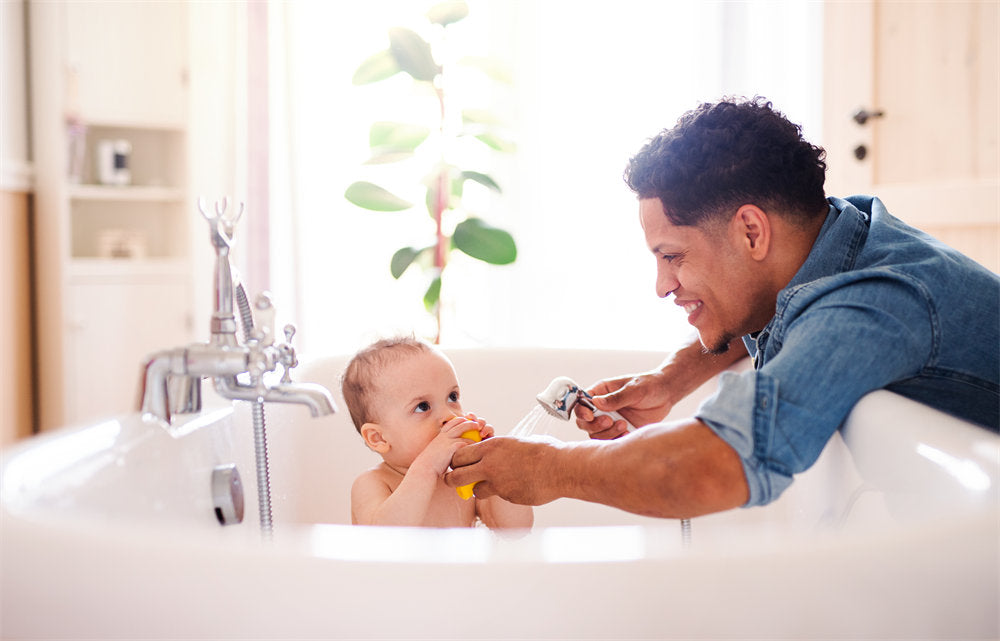
Sometimes, you can alternate by seasons: daily baths when it's hot and baths every other day in the winter. If your child has psoriasis or eczema, you'll find that this bathing schedule isn't as simple.
20. How Can I Help Control My One-Year-Old's Eczema?
Eczema is a dry, itchy skin condition that affects patches of skin. It's uncomfortable and causes your little one to itch and scratch, even to the point of bleeding. The more it's itched, the worse it gets. Obviously, one-year-olds don't understand this.
Controlling your one-year-old's eczema starts with talking to your pediatrician or dermatologist, who will likely prescribe a steroid cream, recommend taking fewer baths, and instruct you to put gloves on your toddler when he sleeps to minimize scratching.
A long-term strategy for preventing breakouts is changing soaps and detergents. Throw out any soaps, shampoos, and detergents that contain fragrance oils, dyes, sulfates, or additives. Replace them with fragrance-free or natural ingredients. I go over this more in-depth in Going Green: How to Create a Sustainable Home for Your Family.
21. Is It Okay to Let My One-Year-Old Sleep with Me?
Yes and no. In some cultures, it is normal for children to sleep with their parents for years. However, co-sleeping is dangerous in your own bed because you could roll onto your child. Regular co-sleeping could also lead to your toddler resisting falling asleep on her own.
When your toddler struggles to sleep due to congestion, fever, or coughing, letting her fall asleep with you may be necessary, but only do so in a recliner or another seat you won't try to roll over in.
22. How Much Sugar Can My One-Year-Old Have?
It turns out that children under 2 years of age should NOT have any added sugars (source). For one, babies and toddlers eat so little at a time, and they are growing so much that they need quality calories, not empty surges of energy.

For another, processed sugar is something we all crave and struggle to control as adults, so we should probably be wary of giving it to toddlers who haven't learned self-control yet.
23. Should I Stop Using a Chest Carrier to Carry My One-Year-Old?
Every chest carrier has a weight limit, typically 18-20 pounds for a light carrier and 35 pounds for a sturdier one. Another thing to check is height and circulation. If your one-year-old is lanky and long, you may find it uncomfortable to have her sitting in the carrier.
On the other hand, if her legs cool down quickly in the carrier, it may be time to retire it and switch to a stroller.
24. Is Screen Time Okay for My One-Year-Old?
Babies and toddlers before three years of age should have no more than an hour of screen time in a day, and less or none at all is even better. It turns out that, despite what marketing tells parents, babies and toddlers don't learn well from someone on a screen (source).
Little kids and babies don't pick up on subtle facial cues and body language in real life, even when they are accustomed to the much more emphatic cues they see on screens. But no one talks like that in daily life, so subtle "normal" cues simply go over screen babies' heads.
I know the TV is a lifesaver during the most hectic times of day, but opting for open-ended playtime toys is far more helpful to your one-year-old in the long run. Learn more in Toddlers and TV: How Much Screen Time Is Okay?
25. Does My One-Year-Old Understand When I'm Upset, Angry, or Overwhelmed?
Yes, your one-year-old understands that something is off when you are upset, angry, or overwhelmed. He won't understand why, what caused it, or how to act around you during such episodes, but he can tell you are not acting like yourself.
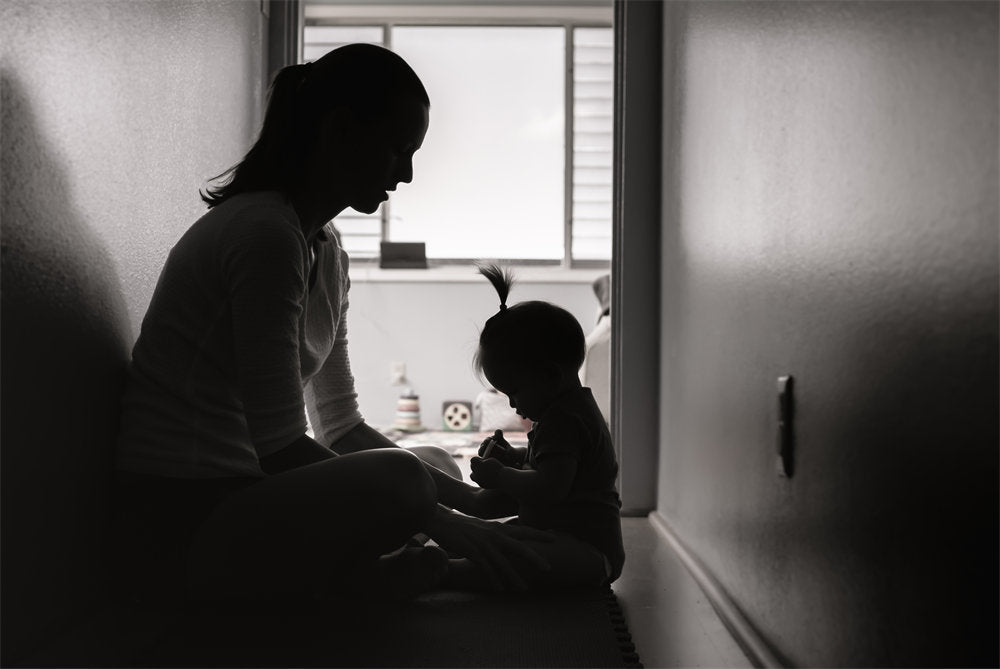
So, you must maintain self-control and avoid lashing out or blaming your one-year-old for not giving you a break. He has no way of knowing how to act appropriately in these situations, and he may even cry, fuss, or demand more of your attention when you are upset about something else.
The thing is, you are your one-year-old's comfort. So, when you are not comforting, the only one he can turn to is you. It's not manipulation or selfishness; it's feeling uneasy and needing to know he is safe with you.
25 Questions First-time Parents Ask About Their Toddler's Development
Just when you are beginning to feel like you're a great parent, the toddler years hit. We've already addressed that 13- to 24-month stage of early toddlerhood, so now it's time to discuss the two- and three-year-old stages.

Affectionately known as the "Terrible Twos" and "Threenager" stages, the toddler years are challenging. Your little one has more complex skills, feels more independent, gets into more trouble, and experiences bigger feelings, but can't yet identify or express them.
Here are answers to 25 toddler development questions (plus a few more).
1. When Should My Toddler Start Walking?
Most toddlers begin walking between 9 and 15 months old, but may start as early as 8 months or as late as 18 months. Roughly half of all children walk by 12 months, but the American Academy of Pediatrics has shifted the milestone for "independent walking" to 18 months (source).
Typically, babies progress from rolling to pushing up to hands and knees to rocking to crawling to pulling up to cruising by their first birthday. Those first independent steps often happen between 12 and 15 months, but if your tiny tot isn't following suit, don't worry! Every child develops at his own pace!
2. How Many Words Should My Toddler Be Able to Say by Now?
Toddlers vary drastically in when they start speaking and how many words they use. Toddlers with older siblings who talk for them tend to speak for themselves later, while firstborns typically speak earlier. However, linguistic ability usually levels out over time (source).
Around her first birthday, a toddler typically waves "bye-bye," calls parents "mama" or "dada," and understands "no." By 15 months, a toddler usually tries to say one or two words for favorite things, like "ba" for ball, "da" for dog, or "my" for mine. However, her understanding of physical vocabulary around your home is decent (source).
18-month-olds can typically string together three or more words to get their point across and understand simple instructions without hand gestures. By 24 months, a toddler can point to things you ask about, say things like "more food," and use several simple gestures to communicate (source).
Language skills explode over the next year. By 30 months old, a toddler usually says about 50 words, pairs nouns and verbs to form simple sentences, and begins using pronouns like "I," "we," and "me" (source).
This progresses to short and sweet conversations, questions, and descriptions that others can somewhat understand at 36 months old (source).
3. When Should My Toddler Be Able to Follow Simple Directions?
Every toddler is different, but you likely won't see your toddler consistently follow simple directions until she is around 24 to 30 months old (source).

Before this, she may understand routine directions or your hand gestures ("Look at that!"), but don't expect her to clean her room without you there.
Expectations are a significant hurdle for first-time parents because they can be too advanced or lax. Work with your toddler early on by explaining what you are doing simply around the house. This will likely help her learn vocabulary and associate words with actions sooner.
4. How Much Sleep Does My Toddler Need?
Toddlers need significantly more sleep than adults do, but some manage to get by on less. The main thing is to ensure they don't have habits that hinder sleep, like having a bright night light, drinking lots of fluids before bedtime, eating sugar before bedtime, or watching a screen within 2 hours of bedtime.
Here is a quick reference chart for toddler sleep in a twenty-four-hour period (including daytime naps) (source):
Age |
Hours of Sleep in 24 Hours (including naps) |
4-12 months old |
12-16 hours |
1-2 years old |
11-14 hours |
3-5 years old |
10-13 hours |
5. When Should My Toddler Stop Using a Pacifier?
You should start weaning your toddler from a pacifier or sucking on his fingers between 12 and 18 months of age because these habits may increase the chances of ear infections (source).
Beyond a year and a half of age, sucking on pacifiers or fingers habitually can affect dental health. For example, jaw alignment and crooked teeth are more likely to be associated with long-term sucking habits (source).
To break a pacifier habit, you can offer a replacement comfort item, such as a stuffed animal, a security blanket, or a favorite book. You can even let your little one pick out a new toy to replace the pacifier, or throw away all the pacifiers in your house. A gentler approach is rewarding your toddler every time he removes the pacifier.
Sucking fingers is an admittedly more difficult habit to break because their fingers are always available. You can try weaning with a combination of the following:
Apply a bitter-tasting nail polish to fingernails
Give him a "busy toy" that requires both hands
Keep a book nearby that requires both hands (flaps, textures, slides)
Make a goofy game up to play that distracts his sucking
Ask him to stop sucking and give a reward for obedience
Do a dance together during times he tends to sit still and suck his fingers
Give him a comfort item for stressful times when he tends to soothe himself by sucking his fingers
6. When Should My Toddler Be Potty-Trained?
Potty training is a difficult process that varies greatly from child to child. Most parents begin asking their 18-month-old toddlers if they have a wet or dirty diaper and start training them around 24 months old.

However, potty training is a long process, with complete daytime success between 30 and 36 months and nighttime success between 3 and 4 years old (source). Some kids struggle with nighttime accidents until they are 7 or 8 years old!
What Are Some Signs That My Toddler Is Ready for Potty Training?
Your toddler is ready for toilet training when she consistently communicates full diapers or says she needs to pee or poop before it happens. Likewise, you want to ensure she can get to the toilet, pull her pants down, and sit on it herself to avoid falling right next to it.
Your toddler may also be ready when she expresses an interest in trying or sitting on the toilet like mommy.
How Can I Make Potty Training More Doable for My Toddler?
The best thing you can do to make potty training easier for your toddler is to stay calm. If you blow up in anger, frustration, or annoyance whenever your little one has an accident or "doesn't do it right," you will crush his confidence to even try.
Logistically, buying a stool and a kid's portable toilet or a toilet seat will give your toddler easy access, and switching to pull-ups will help, too! You can even do a "potty dance" or give a big high-five every time your toddler successfully uses the toilet. Celebrate wins!
What Should I Do If My Toddler Is Not Potty-Trained By a Certain Age?
If your toddler is three and a half or four years old and not interested in potty training, contact your pediatrician for advice. Some toddlers just need to hear instructions from another authority figure they don't see that often.
You can also try using a watch with a timer, reminding your toddler to use the bathroom every hour or two. If your child persistently resists potty training beyond age 4 (and there is nothing medically hampering her ability to use the toilet), teach her to clean up after herself.
7. How Can I Help My Toddler Learn to Share?
The first and best way to teach your toddler to share is by showing her what sharing is often. Share with your partner, share with other adults, and share with other kids. If you know other families that practice sharing well, let your toddler play with them so she can experience it. Kids learn by watching.
Sharing is a big theme in TV shows like Bluey and Daniel Tiger, but key body language is missing from cartoon animation. So, though your toddler will hear the concept of sharing in these shows, she needs to see it happen in real life to learn how to practice it.
8. When Should I Start Disciplining My Toddler?
Discipline is such a touchy topic because everyone has had parents or guardians who messed up at some point and acted in anger. Discipline should never be an angry act by parents or a fearful event for children—ever. It should be a learning opportunity.

Babies and toddlers have no idea if their actions are right or wrong, pleasant or painful, helpful or harmful. Parents must teach them by rewarding good behavior and punishing wrong or harmful behavior. Doing so lovingly is discipline.
Start disciplining your child gently from the beginning. Not by smacking, but by saying, "No baby, that's not for you" or "That hurts, baby; please stop," and moving the baby or the item from the problem.
How Can I Discipline My Toddler Without Spanking?
Independent toddlers are far more testy than clingy ones, so simple reinforcement like this is not always enough. Swatting a hand that is reaching for something dangerous or getting into something the toddler has already been warned about is acceptable in the first year.
The swat should be gentle, but your toddler will likely cry from hurt feelings or a surprise. Comfort him and explain in a sentence or two that he is not supposed to have that item because it's dangerous or for someone else. If the forbidden item is not immediately dangerous or breakable, you can say so first and smack his hand later.
When your toddler is around 2 years old, you can try using a timeout chair and setting a 2-minute timer. Any longer, your toddler will likely forget why he's there and start playing with toys.
Anytime you instruct your toddler or try to give simple instructions, say his name and look right into his eyes. Your toddler is off in his own world most of the time, so he likely doesn't hear you unless you come into his view and engage with him. You should never yell or jerk your toddler for not responding immediately.
The hardest thing with any kind of discipline is tying the consequence to the action; it must make sense. Young toddlers won't understand how a punishment fits the crime, but by three years old, they do, with consistency.
If you have already struggled in this area, don't guilt-trip yourself. Read more in Am I Ruining My Children? Honest Questions Every Parent Eventually Asks.
9. How Can I Help My Toddler Get Used to a New Sibling?
Adjusting to a new sibling is one of the sweetest times! Don't worry; most toddlers adjust naturally. The main thing you can do to help her adjust is give her a job to help the baby.

Giving your toddler a job related to the baby will help her feel involved and provide a sense of responsibility. However, the job you give must be simple and supervised to avoid misunderstandings or mishaps. Here are a few options:
Find the pacifier
Grab a spit-up cloth
Find a blanket
Read a book to the baby
Hand the baby a rattle
Do tummy time with the baby
Tell you when the baby spits up
Don't ask your toddler to put a blanket on the baby, wipe up spit-up, lift the baby, or feed the baby a bottle of milk, because these situations can quickly turn disastrous or dangerous.
10. How Much Screen Time Is Too Much for My Toddler?
Children under 18 months of age should not have any screen time (other than video chats with family) because it hampers their linguistic learning and social skills (source). Even educational programming has not been proven to benefit toddlers and babies this young, so avoid it.
It's even better to keep screen time nonexistent or heavily limited between 18 and 36 months of age, even though the AAP says you can give them 30-60 minutes.
With 1 million neural connections being made in a baby or toddler's brain per second before 36 months old, a ten-minute TV program affects 600,000,000 neural connections! Your toddler will make much better connections by playing with toys, going outside, or talking with you.
11. When Should My Toddler Start Going to the Dentist?
As soon as your baby grows teeth, you can take him to the dentist. Most first dental visits occur between 12 and 24 months of age.
However, call ahead to ask whether your dentist works with children under 2. Most dentists will see kids and adults, but don't have the smaller equipment for toddlers. Most cities and towns have a dentist who will see toddlers; you just need to ask.
12. How Can I Help My Toddler Cope with Separation Anxiety?
Separation anxiety is a natural developmental milestone in toddlers before their second birthday. You can help your toddler cope by staying calm and creating a "bye-bye" routine that you do every time you leave.
We broke down several methods for handling separation anxiety in How to Handle Separation Anxiety in Your One-Year-Old. Check it out!
13. When Should I Start Teaching My Toddler to Read?
You likely won't teach your toddler to read so early, but you can certainly fuel a love for reading by reading books to your child often, making special library trips, and regularly reading yourself.
You can start teaching your toddler to spot numbers and letters between 18 and 24 months. If your little genius is absolutely enthralled with books and identifies letters and numbers by sight and phonics, then you can start teaching sound combinations and sight words.
There are loads of resources online for teaching 3-year-olds sight words, letters, and numbers, so check them out!
14. How Can I Make Learning Fun for My Toddler?
Learning is fun for your toddler if you are having fun! You set the tone and the atmosphere with your enthusiasm and curiosity. Learning will also be fun if it involves sensory stimulation.

Think of sensory toys, bins, and experiences, like a bin full of dried beans and scoops or hands-on exhibits at the science museum. We gave some pointers and preschool sensory activity ideas you can do at home in this article: 7 Unique Preschool Sensory Activities for Homeschool.
15. How Can I Help My Toddler Develop Skills?
Toddlers build skills by following the "monkey-see-monkey-do" method. You are teaching your little one skills by interacting with your toddler, your environment, and others.
So, your child will naturally learn skills by mimicking you, but you can also do other things.
Problem-Solving Skills
Problem-solving is best done by playing with non-electric toys or doing activities with other kids. Sure, you can play with your child, ask questions, and talk through solutions as your toddler listens, but actually sorting out the problem and communicating with other children works wonders for a toddler's social and problem-solving skill development.
Between 3 and 4 years old, some toddlers branch out into simple puzzles, mazes, or building paths for cars and balls, which is fantastic for developing problem-solving skills.
Fine and Gross Motor Skills
Again, playing is the way to go for building fine and gross motor skills. Throughout the first year, your baby naturally developed foundational walking, talking, and reasoning skills.
The same skills will continue to develop and be refined in the toddler years, although gross motor skills are easier for parents to watch. Sensory toys and activities help develop fine and gross motor skills, as does playing with other children.
Language Skills
Linguistically, the silent period ends around 24 months old, which is why the floodgates of babbling, talking to oneself, and asking billions of questions typically open before the third birthday.
Not to sound like a broken record, but language skills are best developed through play and activities with others. Your little one will naturally do lots of imaginative communication, which is excellent for practicing communication in situations (memories or imagined), adding vocabulary, and sorting out feelings.
For more on how crucial play is in language development, read The Importance of Play in Language Development: Best Activities for Babies. You can easily play the games described there with your toddler.
Creativity
A toddler develops creativity on her own, but you can support her by getting involved in her games, taking her to experience different places, reading to her, and giving her plenty of passive, open-ended toys to play with.
Passive toys require no batteries. Without a child playing with them, they do nothing. Open-ended toys are things like blocks, stacking cups, and building toys--there's no one way to play with them, so children have to get creative.
16. How Can I Encourage My Toddler to Be Physically Active?
Toddlers are usually busy running around, getting into things, and learning by doing. But how can parents encourage their toddlers now to keep up that physical activity throughout their lives? It starts with YOU.

If you live a healthy, active lifestyle, your toddler will see that as normal. But if you live a stressful life and crash on the couch whenever you have time off, your child will likely grow to do the same (source).
17. When Should My Toddler Start Playing with Other Children?
Right away! Toddlers and babies need to connect with others their age to learn valuable communication, sharing, teamwork, and problem-solving skills. However, it will take until around 2 years old for your toddler to grasp these concepts well enough to play more freely with others.
Keeping a close eye on littles playing together is a good idea. Anything can happen, and they don't fully understand what hurts others.
18. How Can I Help My Toddler Develop Empathy?
Speaking of not understanding others' pain, empathy is difficult to learn. Empathy is the keen ability to recognize, understand, and share another person's feelings. Getting your toddler to think about how others feel when things happen to them takes time and consistent reinforcement.
Your toddler will begin to understand that others have unique feelings, thoughts, likes, and dislikes around age 3. Some toddlers quickly understand that their actions can impact others' feelings (source). However, your child will still need a few years to develop clear communication and deep empathy.
Helping your toddler develop empathy starts with your example, particularly how you react and name your child's feelings. Reading books and pretending also help "show" and "act out" empathy, but how you handle and talk through real feelings will teach the most.
19. How Can I Help My Toddler Grow a Positive Self-Image?
The easiest way to help your toddler develop a positive self-image is to praise him for his effort and accomplishments — not only when he does things perfectly. Praising effort in doing something is the best way to avoid implying that you expect perfection.
Another way you can do this is by thanking your little one for helping, listening, or giving you things. Making your toddler feel like he contributes to you and the family is a wonderfully grounding way to reinforce littles.
20. When Should My Toddler Start Using a Booster Seat in the Car?
You should never put your toddler in a booster seat. Wait until she is 4-7 years old and has reached the height and weight limits of your forward-facing car seat before shifting her to a booster seat.

She should remain in that booster seat until she reaches its height and weight limit, sometime between 8 and 12 years old (source). It seems like these restrictions last forever, but following these regulations will give your child the best chances of survival in a car accident.
21. How Can I Help My Toddler Cope with Stress?
How to help your toddler cope with stress depends on its source. Is the stress from a dramatic change in your family, such as divorce, a big move, or a relative's death? Or is the stress from the environment, such as lots of noise, angry neighbors, tons of clutter, or a dirty living situation?
Assuming the stress is something you cannot change, the first way to help your toddler is to manage the stress you feel and ensure it doesn't affect your child, such as by not making your toddler easily annoyed, short-tempered, lashing out, yelling at, or ignoring your toddler.
Second, make space and time to comfort your toddler and do a calming activity together. Maybe it's cooking, kneading bread, reading a book, playing with cars, or coloring. It doesn't matter what it is; just do something together to reassure your little one's heart of your love, care, and genuine desire to be together.
22. How Can I Help My Toddler Develop a Love for Nature?
By loving nature yourself! If you love being out in nature, the odds are that you will bring your toddler along to enjoy it with you. Sharing your hobby with your toddler will likely contribute to bonding and feelings of nostalgia down the road.
Another thing you can do is make time to go to the zoo, go camping, visit national parks, swim, canoe, and do anything else nearby. Talking to others about the experiences you two had outdoors will also encourage a love for nature.
23. When Should My Toddler Start Learning a Second Language?
Now! Young children are remarkably capable of picking up a second language. However, they need lots of listening practice in their environment. Perhaps you can speak or play games together using the target language, or spend an hour every day quietly playing while listening to a podcast in that language.
Finding ways to connect your family with speakers of the target language is also essential. We discuss this more in From Babbling to Words: A Comprehensive Guide to Baby Language Development.
24. How Can I Help My Toddler Develop Good Manners?
Good manners come from seeing parents practice good manners daily and from giving consistent consequences for rudeness. The greater struggle here is keeping your expectations in check. Toddlers will eventually exhibit the manners you display; the earlier you start, the better.

Manners you can start reinforcing by example from the beginning are saying "please" and "thank you," sitting at the table together to eat, taking turns to share, and showing respect to others (no pushing, snatching, biting, or screaming at others).
You can teach the signs for "please" and "thank you," along with the words for manners, and make it a rule to wait until you or your toddler is done eating before leaving the table.
25. How Can I Help My Toddler Develop a Sense of Responsibility?
Involving your toddler in household chores can help her develop a sense of responsibility. Involve her in cleaning, cooking, organizing, and decorating, and praise her for participating. Bragging about her help to others makes her feel validated as well!
A sense of responsibility is rooted in belonging and a strong sense of self. Toddlers typically want to be involved in whatever you are doing, so figure out how to do it. Even monotonous tasks like sorting, arranging flowers, feeding fish, or making a paper chain can give your toddler a sense of pride and accomplishment.
When your toddler asks, "Can I help?" try to say yes and assign her a task. Before long, you'll be able to assign her responsibilities like feeding the dog, putting her dishes in the sink, taking a shower or using the bathroom by herself, and much more!
In a Nutshell
Whew! That was quite the parent FAQ! No parent has these early development stages from 0 to 3 figured out, and each child presents his own spin on the process. Every precious moment with your little one forces you to grow and expand in ways you didn't think possible. Enjoy these moments!






